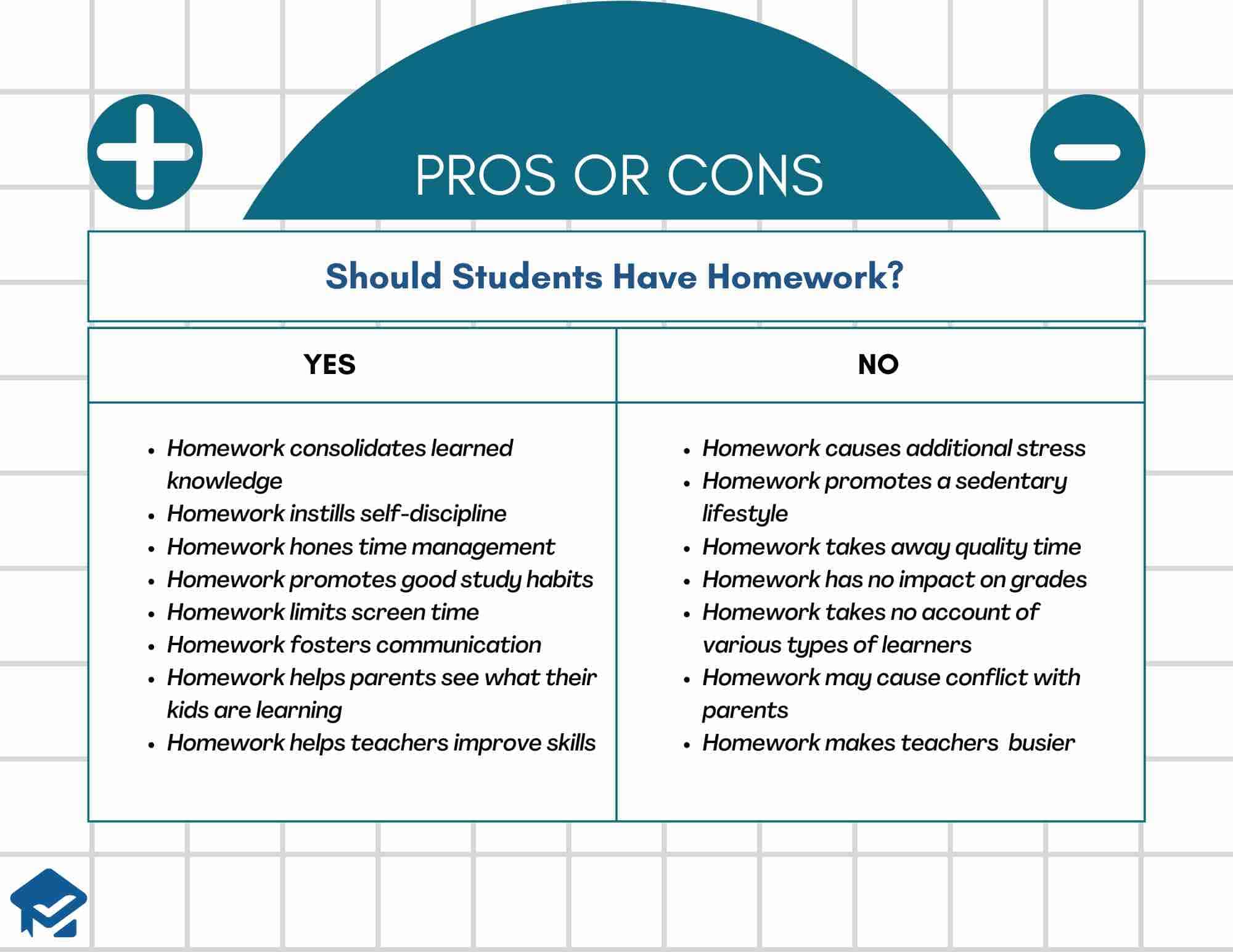
Home > The Pros and Cons of Homework
School Life Balance , Tips for Online Students

The Pros and Cons of Homework
Updated: July 16, 2024
Published: January 23, 2020

Remember those nights when you’d find yourself staring at a mountain of homework, eyes drooping, wondering if you’d ever see the light at the end of the tunnel? The debate over homework’s role in education is as old as time. Is it a crucial tool for reinforcing learning or just an unnecessary burden?
For college students, this question takes on new dimensions. Juggling homework with the endless amount of classes, part-time jobs, and social lives can feel like walking on thin ice. The pressure to maintain grades, meet deadlines, and still find time for friends and relaxation can be overwhelming. So, is homework a friend or foe?

Photo by energepic.com from Pexels
The homework dilemma.
A large amount of college students report feeling overwhelmed by their academic workload, leading to high levels of stress and anxiety. According to Research.com , 45% of college students in the U.S. experience “more than average” stress, with 36.5% citing stress as a major impediment to their academic performance. This stress often stems directly from the homework load, leading to symptoms like headaches, exhaustion, and difficulty sleeping. The intense pressure to manage homework alongside other responsibilities makes us question the true impact of homework on students’ overall well-being.
And then there’s the digital twist. A whopping 89% of students confessed to using AI tools like ChatGPT for their assignments. While these tools can be a godsend for quick answers and assistance, they can also undermine the personal effort and critical thinking necessary to truly understand the material.
On the brighter side, homework can be a powerful ally. According to Inside Higher Ed , structured assignments can actually help reduce stress by providing a clear learning roadmap and keeping students engaged with the material. But where’s the balance between helpful and harmful?
With these perspectives in mind, let’s dive into the pros and cons of homework for college students. By understanding both sides, we can find a middle ground that maximizes learning while keeping stress at bay.
The Pros of Homework
When thoughtfully assigned, homework can be a valuable tool in a student’s educational journey . Let’s explore how homework can be a beneficial companion to your studies:
Enhances Critical Thinking
Homework isn’t just busywork; it’s an opportunity to stretch your mental muscles. Those late-night problem sets and essays can actually encourage deeper understanding and application of concepts. Think of homework as a mental gym; each assignment is a new exercise, pushing you to analyze, synthesize, and evaluate information in ways that strengthen your critical thinking skills .
Time Management Skills
Do you ever juggle multiple deadlines and wonder how to keep it all together? Regular homework assignments can be a crash course in time management . They teach you to prioritize tasks, manage your schedule, and balance academic responsibilities with personal commitments. The ability to juggle various tasks is a skill that will serve you well beyond your college years.
Reinforcement of Learning
There’s a reason why practice makes perfect. Homework reinforces what you’ve learned in class, helping to cement concepts and theories in your mind. Understanding a concept during a lecture is one thing, but applying it through homework can deepen your comprehension and retention.
Preparation for Exams
Think of homework as a sound check and warm-up for exams. Regular assignments keep you engaged with the material, making it easier to review and prepare when exam time rolls around. By consistently working through problems and writing essays, you build a solid foundation that can make the difference between cramming and confident exam performance.
Encourages Independent Learning
Homework promotes a sense of responsibility and independence. It pushes you to tackle assignments on your own, encouraging problem-solving and self-discipline. This independence prepares you for the academic challenges ahead and the autonomy required in your professional and personal life.

The Cons of Homework
Despite its potential benefits, homework can also have significant downsides. Let’s examine the challenges and drawbacks of homework:
Impact on Mental Health
Homework can be a double-edged sword when it comes to mental health . While it’s meant to reinforce learning, the sheer volume of assignments can lead to stress and anxiety. The constant pressure to meet deadlines and the fear of falling behind can create a relentless cycle of stress. Many students become overwhelmed, leading to burnout and negatively impacting their overall well-being.
Limited Time for Other Activities
College isn’t just about hitting the books. It’s also a time for personal growth, exploring new interests, and building social connections. Excessive homework can eat into the time you might otherwise spend on extracurricular activities, hobbies, or simply hanging out with friends. This lack of balance can lead to a less fulfilling college experience. Shouldn’t education be about more than just academics?
Quality Over Quantity
When it comes to homework, more isn’t always better. Piling on assignments can lead to diminished returns on learning. Instead of diving deep into a subject and gaining a thorough understanding, students might rush through tasks just to get them done. This focus on quantity over quality can undermine the educational value of homework.
Inequity in Education
Homework can sometimes exacerbate educational inequalities. Not all students can access the same resources and support systems at home. While some might have a quiet space and access to the internet, others might struggle with distractions and lack of resources. This disparity can put certain students at a disadvantage, making homework more of a burden than a learning tool.
Dependence on AI Tools
With the advent of AI tools like ChatGPT , homework has taken on a new dimension. While these tools can provide quick answers and assistance, they also pose the risk of students becoming overly reliant on technology. This dependence can take away from the actual learning process, as students might bypass the critical thinking and effort needed to truly understand the material. Is convenience worth the potential loss in learning?
Finding the Balance
Finding the right balance with homework means tackling assignments that challenge and support you. Instead of drowning in a sea of tasks, focus on quality over quantity. Choose projects that spark your critical thinking and connect to real-world situations. Flexibility is key here. Recognize that your circumstances are unique, and adjusting your approach can help reduce stress and create a more inclusive learning environment. Constructive feedback makes homework more than just a chore; it turns it into a tool for growth and improvement.
It’s also about living a well-rounded college life. Don’t let homework overshadow other important parts of your life, like extracurricular activities or personal downtime. Emphasize independent learning and use technology wisely to prepare for future challenges. By balancing thoughtful assignments with your personal needs, homework can shift from being a burden to becoming a helpful companion on your educational journey, enriching your academic and personal growth.
Homework has its pros and cons, especially for college students. It can enhance critical thinking, time management, and learning, but it also brings stress, impacts mental health, and can become overwhelming. Finding the right balance is key.
Focus on quality assignments, maintain flexibility, and make sure your homework complements rather than dominates your life. With a thoughtful approach, homework can support your educational journey, fostering both academic success and personal growth.
How can I manage my time effectively to balance homework and other activities?
Create a schedule that allocates specific times for homework, classes, and personal activities. Use planners or digital calendars to keep track of deadlines and prioritize tasks. Don’t forget to include breaks to avoid burnout.
How can I reduce the stress associated with homework?
To manage stress, practice mindfulness techniques like meditation or deep breathing exercises. Break assignments into smaller, manageable tasks and tackle them one at a time. If needed, seek support from classmates, tutors, or mental health professionals.
Is using AI tools for homework cheating?
While AI tools like ChatGPT can be helpful for quick assistance, relying on them too much can hinder your learning process. Use them as a supplement rather than a replacement for your own effort and critical thinking.
How can teachers make homework more equitable?
Teachers can offer flexible deadlines, provide resources for students who lack them, and design assignments that account for different learning styles and home environments. Open communication between students and teachers can also help address individual challenges.
What are some strategies to make homework more meaningful?
Focus on quality over quantity by designing assignments that encourage deep thinking and application of knowledge. Integrate real-world problems to make homework more relevant and engaging. Provide constructive feedback to help students learn and grow from their assignments.
In this article
At UoPeople, our blog writers are thinkers, researchers, and experts dedicated to curating articles relevant to our mission: making higher education accessible to everyone.
Homework – Top 3 Pros and Cons
Pro/Con Arguments | Discussion Questions | Take Action | Sources | More Debates

From dioramas to book reports, from algebraic word problems to research projects, whether students should be given homework, as well as the type and amount of homework, has been debated for over a century. [ 1 ]
While we are unsure who invented homework, we do know that the word “homework” dates back to ancient Rome. Pliny the Younger asked his followers to practice their speeches at home. Memorization exercises as homework continued through the Middle Ages and Enlightenment by monks and other scholars. [ 45 ]
In the 19th century, German students of the Volksschulen or “People’s Schools” were given assignments to complete outside of the school day. This concept of homework quickly spread across Europe and was brought to the United States by Horace Mann , who encountered the idea in Prussia. [ 45 ]
In the early 1900s, progressive education theorists, championed by the magazine Ladies’ Home Journal , decried homework’s negative impact on children’s physical and mental health, leading California to ban homework for students under 15 from 1901 until 1917. In the 1930s, homework was portrayed as child labor, which was newly illegal, but the prevailing argument was that kids needed time to do household chores. [ 1 ] [ 2 ] [ 45 ] [ 46 ]
Public opinion swayed again in favor of homework in the 1950s due to concerns about keeping up with the Soviet Union’s technological advances during the Cold War . And, in 1986, the US government included homework as an educational quality boosting tool. [ 3 ] [ 45 ]
A 2014 study found kindergarteners to fifth graders averaged 2.9 hours of homework per week, sixth to eighth graders 3.2 hours per teacher, and ninth to twelfth graders 3.5 hours per teacher. A 2014-2019 study found that teens spent about an hour a day on homework. [ 4 ] [ 44 ]
Beginning in 2020, the COVID-19 pandemic complicated the very idea of homework as students were schooling remotely and many were doing all school work from home. Washington Post journalist Valerie Strauss asked, “Does homework work when kids are learning all day at home?” While students were mostly back in school buildings in fall 2021, the question remains of how effective homework is as an educational tool. [ 47 ]
Is Homework Beneficial?
Pro 1 Homework improves student achievement. Studies have shown that homework improved student achievement in terms of improved grades, test results, and the likelihood to attend college. Research published in the High School Journal indicated that students who spent between 31 and 90 minutes each day on homework “scored about 40 points higher on the SAT-Mathematics subtest than their peers, who reported spending no time on homework each day, on average.” [ 6 ] Students in classes that were assigned homework outperformed 69% of students who didn’t have homework on both standardized tests and grades. A majority of studies on homework’s impact – 64% in one meta-study and 72% in another – showed that take-home assignments were effective at improving academic achievement. [ 7 ] [ 8 ] Research by the Institute for the Study of Labor (IZA) concluded that increased homework led to better GPAs and higher probability of college attendance for high school boys. In fact, boys who attended college did more than three hours of additional homework per week in high school. [ 10 ] Read More
Pro 2 Homework helps to reinforce classroom learning, while developing good study habits and life skills. Students typically retain only 50% of the information teachers provide in class, and they need to apply that information in order to truly learn it. Abby Freireich and Brian Platzer, co-founders of Teachers Who Tutor NYC, explained, “at-home assignments help students learn the material taught in class. Students require independent practice to internalize new concepts… [And] these assignments can provide valuable data for teachers about how well students understand the curriculum.” [ 11 ] [ 49 ] Elementary school students who were taught “strategies to organize and complete homework,” such as prioritizing homework activities, collecting study materials, note-taking, and following directions, showed increased grades and more positive comments on report cards. [ 17 ] Research by the City University of New York noted that “students who engage in self-regulatory processes while completing homework,” such as goal-setting, time management, and remaining focused, “are generally more motivated and are higher achievers than those who do not use these processes.” [ 18 ] Homework also helps students develop key skills that they’ll use throughout their lives: accountability, autonomy, discipline, time management, self-direction, critical thinking, and independent problem-solving. Freireich and Platzer noted that “homework helps students acquire the skills needed to plan, organize, and complete their work.” [ 12 ] [ 13 ] [ 14 ] [ 15 ] [ 49 ] Read More
Pro 3 Homework allows parents to be involved with children’s learning. Thanks to take-home assignments, parents are able to track what their children are learning at school as well as their academic strengths and weaknesses. [ 12 ] Data from a nationwide sample of elementary school students show that parental involvement in homework can improve class performance, especially among economically disadvantaged African-American and Hispanic students. [ 20 ] Research from Johns Hopkins University found that an interactive homework process known as TIPS (Teachers Involve Parents in Schoolwork) improves student achievement: “Students in the TIPS group earned significantly higher report card grades after 18 weeks (1 TIPS assignment per week) than did non-TIPS students.” [ 21 ] Homework can also help clue parents in to the existence of any learning disabilities their children may have, allowing them to get help and adjust learning strategies as needed. Duke University Professor Harris Cooper noted, “Two parents once told me they refused to believe their child had a learning disability until homework revealed it to them.” [ 12 ] Read More
Con 1 Too much homework can be harmful. A poll of California high school students found that 59% thought they had too much homework. 82% of respondents said that they were “often or always stressed by schoolwork.” High-achieving high school students said too much homework leads to sleep deprivation and other health problems such as headaches, exhaustion, weight loss, and stomach problems. [ 24 ] [ 28 ] [ 29 ] Alfie Kohn, an education and parenting expert, said, “Kids should have a chance to just be kids… it’s absurd to insist that children must be engaged in constructive activities right up until their heads hit the pillow.” [ 27 ] Emmy Kang, a mental health counselor, explained, “More than half of students say that homework is their primary source of stress, and we know what stress can do on our bodies.” [ 48 ] Excessive homework can also lead to cheating: 90% of middle school students and 67% of high school students admit to copying someone else’s homework, and 43% of college students engaged in “unauthorized collaboration” on out-of-class assignments. Even parents take shortcuts on homework: 43% of those surveyed admitted to having completed a child’s assignment for them. [ 30 ] [ 31 ] [ 32 ] Read More
Con 2 Homework exacerbates the digital divide or homework gap. Kiara Taylor, financial expert, defined the digital divide as “the gap between demographics and regions that have access to modern information and communications technology and those that don’t. Though the term now encompasses the technical and financial ability to utilize available technology—along with access (or a lack of access) to the Internet—the gap it refers to is constantly shifting with the development of technology.” For students, this is often called the homework gap. [ 50 ] [ 51 ] 30% (about 15 to 16 million) public school students either did not have an adequate internet connection or an appropriate device, or both, for distance learning. Completing homework for these students is more complicated (having to find a safe place with an internet connection, or borrowing a laptop, for example) or impossible. [ 51 ] A Hispanic Heritage Foundation study found that 96.5% of students across the country needed to use the internet for homework, and nearly half reported they were sometimes unable to complete their homework due to lack of access to the internet or a computer, which often resulted in lower grades. [ 37 ] [ 38 ] One study concluded that homework increases social inequality because it “potentially serves as a mechanism to further advantage those students who already experience some privilege in the school system while further disadvantaging those who may already be in a marginalized position.” [ 39 ] Read More
Con 3 Homework does not help younger students, and may not help high school students. We’ve known for a while that homework does not help elementary students. A 2006 study found that “homework had no association with achievement gains” when measured by standardized tests results or grades. [ 7 ] Fourth grade students who did no homework got roughly the same score on the National Assessment of Educational Progress (NAEP) math exam as those who did 30 minutes of homework a night. Students who did 45 minutes or more of homework a night actually did worse. [ 41 ] Temple University professor Kathryn Hirsh-Pasek said that homework is not the most effective tool for young learners to apply new information: “They’re learning way more important skills when they’re not doing their homework.” [ 42 ] In fact, homework may not be helpful at the high school level either. Alfie Kohn, author of The Homework Myth, stated, “I interviewed high school teachers who completely stopped giving homework and there was no downside, it was all upside.” He explains, “just because the same kids who get more homework do a little better on tests, doesn’t mean the homework made that happen.” [ 52 ] Read More
Discussion Questions
1. Is homework beneficial? Consider the study data, your personal experience, and other types of information. Explain your answer(s).
2. If homework were banned, what other educational strategies would help students learn classroom material? Explain your answer(s).
3. How has homework been helpful to you personally? How has homework been unhelpful to you personally? Make carefully considered lists for both sides.
Take Action
1. Examine an argument in favor of quality homework assignments from Janine Bempechat.
2. Explore Oxford Learning’s infographic on the effects of homework on students.
3. Consider Joseph Lathan’s argument that homework promotes inequality .
4. Consider how you felt about the issue before reading this article. After reading the pros and cons on this topic, has your thinking changed? If so, how? List two to three ways. If your thoughts have not changed, list two to three ways your better understanding of the “other side of the issue” now helps you better argue your position.
5. Push for the position and policies you support by writing US national senators and representatives .
| 1. | Tom Loveless, “Homework in America: Part II of the 2014 Brown Center Report of American Education,” brookings.edu, Mar. 18, 2014 | |
| 2. | Edward Bok, “A National Crime at the Feet of American Parents,” , Jan. 1900 | |
| 3. | Tim Walker, “The Great Homework Debate: What’s Getting Lost in the Hype,” neatoday.org, Sep. 23, 2015 | |
| 4. | University of Phoenix College of Education, “Homework Anxiety: Survey Reveals How Much Homework K-12 Students Are Assigned and Why Teachers Deem It Beneficial,” phoenix.edu, Feb. 24, 2014 | |
| 5. | Organization for Economic Cooperation and Development (OECD), “PISA in Focus No. 46: Does Homework Perpetuate Inequities in Education?,” oecd.org, Dec. 2014 | |
| 6. | Adam V. Maltese, Robert H. Tai, and Xitao Fan, “When is Homework Worth the Time?: Evaluating the Association between Homework and Achievement in High School Science and Math,” , 2012 | |
| 7. | Harris Cooper, Jorgianne Civey Robinson, and Erika A. Patall, “Does Homework Improve Academic Achievement? A Synthesis of Researcher, 1987-2003,” , 2006 | |
| 8. | Gökhan Bas, Cihad Sentürk, and Fatih Mehmet Cigerci, “Homework and Academic Achievement: A Meta-Analytic Review of Research,” , 2017 | |
| 9. | Huiyong Fan, Jianzhong Xu, Zhihui Cai, Jinbo He, and Xitao Fan, “Homework and Students’ Achievement in Math and Science: A 30-Year Meta-Analysis, 1986-2015,” , 2017 | |
| 10. | Charlene Marie Kalenkoski and Sabrina Wulff Pabilonia, “Does High School Homework Increase Academic Achievement?,” iza.og, Apr. 2014 | |
| 11. | Ron Kurtus, “Purpose of Homework,” school-for-champions.com, July 8, 2012 | |
| 12. | Harris Cooper, “Yes, Teachers Should Give Homework – The Benefits Are Many,” newsobserver.com, Sep. 2, 2016 | |
| 13. | Tammi A. Minke, “Types of Homework and Their Effect on Student Achievement,” repository.stcloudstate.edu, 2017 | |
| 14. | LakkshyaEducation.com, “How Does Homework Help Students: Suggestions From Experts,” LakkshyaEducation.com (accessed Aug. 29, 2018) | |
| 15. | University of Montreal, “Do Kids Benefit from Homework?,” teaching.monster.com (accessed Aug. 30, 2018) | |
| 16. | Glenda Faye Pryor-Johnson, “Why Homework Is Actually Good for Kids,” memphisparent.com, Feb. 1, 2012 | |
| 17. | Joan M. Shepard, “Developing Responsibility for Completing and Handing in Daily Homework Assignments for Students in Grades Three, Four, and Five,” eric.ed.gov, 1999 | |
| 18. | Darshanand Ramdass and Barry J. Zimmerman, “Developing Self-Regulation Skills: The Important Role of Homework,” , 2011 | |
| 19. | US Department of Education, “Let’s Do Homework!,” ed.gov (accessed Aug. 29, 2018) | |
| 20. | Loretta Waldman, “Sociologist Upends Notions about Parental Help with Homework,” phys.org, Apr. 12, 2014 | |
| 21. | Frances L. Van Voorhis, “Reflecting on the Homework Ritual: Assignments and Designs,” , June 2010 | |
| 22. | Roel J. F. J. Aries and Sofie J. Cabus, “Parental Homework Involvement Improves Test Scores? A Review of the Literature,” , June 2015 | |
| 23. | Jamie Ballard, “40% of People Say Elementary School Students Have Too Much Homework,” yougov.com, July 31, 2018 | |
| 24. | Stanford University, “Stanford Survey of Adolescent School Experiences Report: Mira Costa High School, Winter 2017,” stanford.edu, 2017 | |
| 25. | Cathy Vatterott, “Rethinking Homework: Best Practices That Support Diverse Needs,” ascd.org, 2009 | |
| 26. | End the Race, “Homework: You Can Make a Difference,” racetonowhere.com (accessed Aug. 24, 2018) | |
| 27. | Elissa Strauss, “Opinion: Your Kid Is Right, Homework Is Pointless. Here’s What You Should Do Instead.,” cnn.com, Jan. 28, 2020 | |
| 28. | Jeanne Fratello, “Survey: Homework Is Biggest Source of Stress for Mira Costa Students,” digmb.com, Dec. 15, 2017 | |
| 29. | Clifton B. Parker, “Stanford Research Shows Pitfalls of Homework,” stanford.edu, Mar. 10, 2014 | |
| 30. | AdCouncil, “Cheating Is a Personal Foul: Academic Cheating Background,” glass-castle.com (accessed Aug. 16, 2018) | |
| 31. | Jeffrey R. Young, “High-Tech Cheating Abounds, and Professors Bear Some Blame,” chronicle.com, Mar. 28, 2010 | |
| 32. | Robin McClure, “Do You Do Your Child’s Homework?,” verywellfamily.com, Mar. 14, 2018 | |
| 33. | Robert M. Pressman, David B. Sugarman, Melissa L. Nemon, Jennifer, Desjarlais, Judith A. Owens, and Allison Schettini-Evans, “Homework and Family Stress: With Consideration of Parents’ Self Confidence, Educational Level, and Cultural Background,” , 2015 | |
| 34. | Heather Koball and Yang Jiang, “Basic Facts about Low-Income Children,” nccp.org, Jan. 2018 | |
| 35. | Meagan McGovern, “Homework Is for Rich Kids,” huffingtonpost.com, Sep. 2, 2016 | |
| 36. | H. Richard Milner IV, “Not All Students Have Access to Homework Help,” nytimes.com, Nov. 13, 2014 | |
| 37. | Claire McLaughlin, “The Homework Gap: The ‘Cruelest Part of the Digital Divide’,” neatoday.org, Apr. 20, 2016 | |
| 38. | Doug Levin, “This Evening’s Homework Requires the Use of the Internet,” edtechstrategies.com, May 1, 2015 | |
| 39. | Amy Lutz and Lakshmi Jayaram, “Getting the Homework Done: Social Class and Parents’ Relationship to Homework,” , June 2015 | |
| 40. | Sandra L. Hofferth and John F. Sandberg, “How American Children Spend Their Time,” psc.isr.umich.edu, Apr. 17, 2000 | |
| 41. | Alfie Kohn, “Does Homework Improve Learning?,” alfiekohn.org, 2006 | |
| 42. | Patrick A. Coleman, “Elementary School Homework Probably Isn’t Good for Kids,” fatherly.com, Feb. 8, 2018 | |
| 43. | Valerie Strauss, “Why This Superintendent Is Banning Homework – and Asking Kids to Read Instead,” washingtonpost.com, July 17, 2017 | |
| 44. | Pew Research Center, “The Way U.S. Teens Spend Their Time Is Changing, but Differences between Boys and Girls Persist,” pewresearch.org, Feb. 20, 2019 | |
| 45. | ThroughEducation, “The History of Homework: Why Was It Invented and Who Was behind It?,” , Feb. 14, 2020 | |
| 46. | History, “Why Homework Was Banned,” (accessed Feb. 24, 2022) | |
| 47. | Valerie Strauss, “Does Homework Work When Kids Are Learning All Day at Home?,” , Sep. 2, 2020 | |
| 48. | Sara M Moniuszko, “Is It Time to Get Rid of Homework? Mental Health Experts Weigh In,” , Aug. 17, 2021 | |
| 49. | Abby Freireich and Brian Platzer, “The Worsening Homework Problem,” , Apr. 13, 2021 | |
| 50. | Kiara Taylor, “Digital Divide,” , Feb. 12, 2022 | |
| 51. | Marguerite Reardon, “The Digital Divide Has Left Millions of School Kids Behind,” , May 5, 2021 | |
| 52. | Rachel Paula Abrahamson, “Why More and More Teachers Are Joining the Anti-Homework Movement,” , Sep. 10, 2021 |
More School Debate Topics
Should K-12 Students Dissect Animals in Science Classrooms? – Proponents say dissecting real animals is a better learning experience. Opponents say the practice is bad for the environment.
Should Students Have to Wear School Uniforms? – Proponents say uniforms may increase student safety. Opponents say uniforms restrict expression.
Should Corporal Punishment Be Used in K-12 Schools? – Proponents say corporal punishment is an appropriate discipline. Opponents say it inflicts long-lasting physical and mental harm on students.
ProCon/Encyclopaedia Britannica, Inc. 325 N. LaSalle Street, Suite 200 Chicago, Illinois 60654 USA
Natalie Leppard Managing Editor [email protected]
© 2023 Encyclopaedia Britannica, Inc. All rights reserved
- Social Media
- Death Penalty
- School Uniforms
- Video Games
- Animal Testing
- Gun Control
- Banned Books
- Teachers’ Corner
Cite This Page
ProCon.org is the institutional or organization author for all ProCon.org pages. Proper citation depends on your preferred or required style manual. Below are the proper citations for this page according to four style manuals (in alphabetical order): the Modern Language Association Style Manual (MLA), the Chicago Manual of Style (Chicago), the Publication Manual of the American Psychological Association (APA), and Kate Turabian's A Manual for Writers of Term Papers, Theses, and Dissertations (Turabian). Here are the proper bibliographic citations for this page according to four style manuals (in alphabetical order):
[Editor's Note: The APA citation style requires double spacing within entries.]
[Editor’s Note: The MLA citation style requires double spacing within entries.]

Is homework a necessary evil?
After decades of debate, researchers are still sorting out the truth about homework’s pros and cons. One point they can agree on: Quality assignments matter.
By Kirsten Weir
March 2016, Vol 47, No. 3
Print version: page 36

- Schools and Classrooms
Homework battles have raged for decades. For as long as kids have been whining about doing their homework, parents and education reformers have complained that homework's benefits are dubious. Meanwhile many teachers argue that take-home lessons are key to helping students learn. Now, as schools are shifting to the new (and hotly debated) Common Core curriculum standards, educators, administrators and researchers are turning a fresh eye toward the question of homework's value.
But when it comes to deciphering the research literature on the subject, homework is anything but an open book.
The 10-minute rule
In many ways, homework seems like common sense. Spend more time practicing multiplication or studying Spanish vocabulary and you should get better at math or Spanish. But it may not be that simple.
Homework can indeed produce academic benefits, such as increased understanding and retention of the material, says Duke University social psychologist Harris Cooper, PhD, one of the nation's leading homework researchers. But not all students benefit. In a review of studies published from 1987 to 2003, Cooper and his colleagues found that homework was linked to better test scores in high school and, to a lesser degree, in middle school. Yet they found only faint evidence that homework provided academic benefit in elementary school ( Review of Educational Research , 2006).
Then again, test scores aren't everything. Homework proponents also cite the nonacademic advantages it might confer, such as the development of personal responsibility, good study habits and time-management skills. But as to hard evidence of those benefits, "the jury is still out," says Mollie Galloway, PhD, associate professor of educational leadership at Lewis & Clark College in Portland, Oregon. "I think there's a focus on assigning homework because [teachers] think it has these positive outcomes for study skills and habits. But we don't know for sure that's the case."
Even when homework is helpful, there can be too much of a good thing. "There is a limit to how much kids can benefit from home study," Cooper says. He agrees with an oft-cited rule of thumb that students should do no more than 10 minutes a night per grade level — from about 10 minutes in first grade up to a maximum of about two hours in high school. Both the National Education Association and National Parent Teacher Association support that limit.
Beyond that point, kids don't absorb much useful information, Cooper says. In fact, too much homework can do more harm than good. Researchers have cited drawbacks, including boredom and burnout toward academic material, less time for family and extracurricular activities, lack of sleep and increased stress.
In a recent study of Spanish students, Rubén Fernández-Alonso, PhD, and colleagues found that students who were regularly assigned math and science homework scored higher on standardized tests. But when kids reported having more than 90 to 100 minutes of homework per day, scores declined ( Journal of Educational Psychology , 2015).
"At all grade levels, doing other things after school can have positive effects," Cooper says. "To the extent that homework denies access to other leisure and community activities, it's not serving the child's best interest."
Children of all ages need down time in order to thrive, says Denise Pope, PhD, a professor of education at Stanford University and a co-founder of Challenge Success, a program that partners with secondary schools to implement policies that improve students' academic engagement and well-being.
"Little kids and big kids need unstructured time for play each day," she says. Certainly, time for physical activity is important for kids' health and well-being. But even time spent on social media can help give busy kids' brains a break, she says.
All over the map
But are teachers sticking to the 10-minute rule? Studies attempting to quantify time spent on homework are all over the map, in part because of wide variations in methodology, Pope says.
A 2014 report by the Brookings Institution examined the question of homework, comparing data from a variety of sources. That report cited findings from a 2012 survey of first-year college students in which 38.4 percent reported spending six hours or more per week on homework during their last year of high school. That was down from 49.5 percent in 1986 ( The Brown Center Report on American Education , 2014).
The Brookings report also explored survey data from the National Assessment of Educational Progress, which asked 9-, 13- and 17-year-old students how much homework they'd done the previous night. They found that between 1984 and 2012, there was a slight increase in homework for 9-year-olds, but homework amounts for 13- and 17-year-olds stayed roughly the same, or even decreased slightly.
Yet other evidence suggests that some kids might be taking home much more work than they can handle. Robert Pressman, PhD, and colleagues recently investigated the 10-minute rule among more than 1,100 students, and found that elementary-school kids were receiving up to three times as much homework as recommended. As homework load increased, so did family stress, the researchers found ( American Journal of Family Therapy , 2015).
Many high school students also seem to be exceeding the recommended amounts of homework. Pope and Galloway recently surveyed more than 4,300 students from 10 high-achieving high schools. Students reported bringing home an average of just over three hours of homework nightly ( Journal of Experiential Education , 2013).
On the positive side, students who spent more time on homework in that study did report being more behaviorally engaged in school — for instance, giving more effort and paying more attention in class, Galloway says. But they were not more invested in the homework itself. They also reported greater academic stress and less time to balance family, friends and extracurricular activities. They experienced more physical health problems as well, such as headaches, stomach troubles and sleep deprivation. "Three hours per night is too much," Galloway says.
In the high-achieving schools Pope and Galloway studied, more than 90 percent of the students go on to college. There's often intense pressure to succeed academically, from both parents and peers. On top of that, kids in these communities are often overloaded with extracurricular activities, including sports and clubs. "They're very busy," Pope says. "Some kids have up to 40 hours a week — a full-time job's worth — of extracurricular activities." And homework is yet one more commitment on top of all the others.
"Homework has perennially acted as a source of stress for students, so that piece of it is not new," Galloway says. "But especially in upper-middle-class communities, where the focus is on getting ahead, I think the pressure on students has been ratcheted up."
Yet homework can be a problem at the other end of the socioeconomic spectrum as well. Kids from wealthier homes are more likely to have resources such as computers, Internet connections, dedicated areas to do schoolwork and parents who tend to be more educated and more available to help them with tricky assignments. Kids from disadvantaged homes are more likely to work at afterschool jobs, or to be home without supervision in the evenings while their parents work multiple jobs, says Lea Theodore, PhD, a professor of school psychology at the College of William and Mary in Williamsburg, Virginia. They are less likely to have computers or a quiet place to do homework in peace.
"Homework can highlight those inequities," she says.
Quantity vs. quality
One point researchers agree on is that for all students, homework quality matters. But too many kids are feeling a lack of engagement with their take-home assignments, many experts say. In Pope and Galloway's research, only 20 percent to 30 percent of students said they felt their homework was useful or meaningful.
"Students are assigned a lot of busywork. They're naming it as a primary stressor, but they don't feel it's supporting their learning," Galloway says.
"Homework that's busywork is not good for anyone," Cooper agrees. Still, he says, different subjects call for different kinds of assignments. "Things like vocabulary and spelling are learned through practice. Other kinds of courses require more integration of material and drawing on different skills."
But critics say those skills can be developed with many fewer hours of homework each week. Why assign 50 math problems, Pope asks, when 10 would be just as constructive? One Advanced Placement biology teacher she worked with through Challenge Success experimented with cutting his homework assignments by a third, and then by half. "Test scores didn't go down," she says. "You can have a rigorous course and not have a crazy homework load."
Still, changing the culture of homework won't be easy. Teachers-to-be get little instruction in homework during their training, Pope says. And despite some vocal parents arguing that kids bring home too much homework, many others get nervous if they think their child doesn't have enough. "Teachers feel pressured to give homework because parents expect it to come home," says Galloway. "When it doesn't, there's this idea that the school might not be doing its job."
Galloway argues teachers and school administrators need to set clear goals when it comes to homework — and parents and students should be in on the discussion, too. "It should be a broader conversation within the community, asking what's the purpose of homework? Why are we giving it? Who is it serving? Who is it not serving?"
Until schools and communities agree to take a hard look at those questions, those backpacks full of take-home assignments will probably keep stirring up more feelings than facts.
Further reading
- Cooper, H., Robinson, J. C., & Patall, E. A. (2006). Does homework improve academic achievement? A synthesis of research, 1987-2003. Review of Educational Research, 76 (1), 1–62. doi: 10.3102/00346543076001001
- Galloway, M., Connor, J., & Pope, D. (2013). Nonacademic effects of homework in privileged, high-performing high schools. The Journal of Experimental Education, 81 (4), 490–510. doi: 10.1080/00220973.2012.745469
- Pope, D., Brown, M., & Miles, S. (2015). Overloaded and underprepared: Strategies for stronger schools and healthy, successful kids . San Francisco, CA: Jossey-Bass.
Letters to the Editor
- Send us a letter

20 Pros and Cons of Homework
Homework. It’s a word that sends a shudder down the spine of students and parents alike.
It is also a question that has become divisive. Some people feel that homework is an effective way to reinforce the concepts that were learned at school. Others feel like the time that homework demands would be better spent with a meaningful activity that brings the family together.
Is homework important? Is it necessary? Or is the added stress that homework places on students and parents doing more harm than good? Here are some of the key pros and cons to discuss.
List of the Pros of Homework
1. It encourages the discipline of practice. Repeating the same problems over and over can be boring and difficult, but it also reinforces the practice of discipline. To get better at a skill, repetition is often necessary. You get better with each repetition. By having homework completed every night, especially with a difficult subject, the concepts become easier to understand. That gives the student an advantage later on in life when seeking a vocational career.
2. It gets parents involved with a child’s life. Looking at Common Core math can be somewhat bewildering to parents. If you see the math problem 5×3 expressed as an addition problem, 5+5+5 seems like the right answer. The correct answer, however, would be 3+3+3+3+3. By bringing homework to do, students can engage their learning process with their parents so everyone can be involved. Many parents actually want homework sent so they can see what their children are being taught in the classroom.
3. It teaches time management skills. Homework goes beyond completing a task. It forces children (and parents, to some extent) to develop time management skills. Schedules must be organized to ensure that all tasks can be completed during the day. This creates independent thinking and develops problem-solving skills. It encourages research skills. It also puts parents and children into a position where positive decision-making skills must be developed.
4. Homework creates a communication network. Teachers rarely see into the family lives of their students. Parents rarely see the classroom lives of their children. Homework is a bridge that opens lines of communication between the school, the teacher, and the parent. This allows everyone to get to know one another better. It helps teachers understand the needs of their students better.
It allows parents to find out their child’s strengths and weaknesses. Together, an educational plan can be developed that encourages the best possible learning environment.
5. It allows for a comfortable place to study. Classrooms have evolved over the years to be a warmer and welcoming environment, but there is nothing like the comfort that is felt at home or in a safe space. By encouraging studies where a child feels the most comfortable, it is possible to retain additional information that may get lost within the standard classroom environment.
6. It provides more time to complete the learning process. The time allotted for each area of study in school, especially in K-12, is often limited to 1 hour or less per day. That is not always enough time for students to be able to grasp core concepts of that material. By creating specific homework assignments which address these deficiencies, it becomes possible to counter the effects of the time shortages. That can benefit students greatly over time.
7. It reduces screen time. On the average school night, a student in the US might get 3-4 hours of screen time in per day. When that student isn’t in school, that figure doubles to 7-8 hours of screen time. Homework might be unwanted and disliked, but it does encourage better study habits. It discourages time being spent in front of the television or playing games on a mobile device. That, in turn, may discourage distracting habits from forming that can take away from the learning process in the future.
8. It can be treated like any other extracurricular activity. Some families over-extend themselves on extracurricular activities. Students can easily have more than 40 hours per week, from clubs to sports, that fall outside of regular school hours. Homework can be treated as one of these activities, fitting into the schedule where there is extra time. As an added benefit, some homework can even be completed on the way to or from some activities.
List of the Cons of Homework
1. Children benefit from playing. Being in a classroom can be a good thing, but so can being on a playground. With too much homework, a child doesn’t have enough time to play and that can impact their learning and social development. Low levels of play are associated with lower academic achievement levels, lower safety awareness, less character development, and lower overall health.
2. It encourages a sedentary lifestyle. Long homework assignments require long periods of sitting. A sedentary lifestyle has numerous direct associations with premature death as children age into adults. Obesity levels are already at or near record highs in many communities. Homework may reinforce certain skills and encourage knowledge retention, but it may come at a high price.
3. Not every home is a beneficial environment. There are some homes that are highly invested into their children. Parents may be involved in every stage of homework or there may be access to tutors that can explain difficult concepts. In other homes, there may be little or no education investment into the child. Some parents push the responsibility of teaching off on the teacher and provide no homework support at all.
Sometimes parents may wish to be involved and support their child, but there are barriers in place that prevent this from happening. The bottom line is this: no every home life is equal.
4. School is already a full-time job for kids. An elementary school day might start at 9:00am and end at 3:20pm. That’s more than 6 hours of work that kids as young as 5 are putting into their education every day. Add in the extra-curricular activities that schools encourage, such as sports, musicals, and after-school programming and a student can easily reach 8 hours of education in the average day. Then add homework on top of that? It is asking a lot for any child, but especially young children, to complete extra homework.
5. There is no evidence that homework creates improvements. Survey after survey has found that the only thing that homework does is create a negative attitude toward schooling and education in general. Homework is not associated with a higher level of academic achievement on a national scale. It may help some students who struggle with certain subjects, if they have access to a knowledgeable tutor or parent, but on a community level, there is no evidence that shows improvements are gained.
6. It discourages creative endeavors. If a student is spending 1 hour each day on homework, that’s an hour they are not spending pursuing something that is important to them. Students might like to play video games or watch TV, but homework takes time away from learning an instrument, painting, or developing photography skills as well. Although some homework can involve creative skills, that usually isn’t the case.
7. Homework is difficult to enforce. Some students just don’t care about homework. They can achieve adequate grades without doing it, so they choose not to do it. There is no level of motivation that a parent or teacher can create that inspires some students to get involved with homework. There is no denying the fact that homework requires a certain amount of effort. Sometimes a child just doesn’t want to put in that effort.
8. Extra time in school does not equate to better grades. Students in the US spend more than 100 hours of extra time in school already compared to high-performing countries around the world, but that has not closed the educational gap between those countries and the United States. In some educational areas, the US is even falling in global rankings despite the extra time that students are spending in school. When it comes to homework or any other form of learning, quality is much more important than quantity.
9. Accurate practice may not be possible. If homework is assigned, there is a reliance on the student, their parents, or their guardians to locate resources that can help them understand the content. Homework is often about practice, but if the core concepts of that information are not understood or inaccurately understood, then the results are the opposite of what is intended. If inaccurate practice is performed, it becomes necessary for the teacher to first correct the issue and then reteach it, which prolongs the learning process.
10. It may encourage cheating on multiple levels. Some students may decide that cheating in the classroom to avoid taking homework home is a compromise they’re willing to make. With internet resources, finding the answers to homework instead of figuring out the answers on one’s own is a constant temptation as well. For families with multiple children, they may decide to copy off one another to minimize the time investment.
11. Too much homework is often assigned to students. There is a general agreement that students should be assigned no more than 10 minutes of homework per day, per grade level. That means a first grader should not be assigned more than 10 minutes of homework per night. Yet for the average first grader in US public schools, they come home with 20 minutes of homework and then are asked to complete 20 minutes of reading on top of that. That means some students are completing 4x more homework than recommended every night.
At the same time, the amount of time children spent playing outdoors has decreased by 40% over the past 30 years.
For high school students, it is even worse at high performing schools in the US where 90% of graduates go onto college, the average amount of homework assigned per night was 3 hours per student.
12. Homework is often geared toward benchmarks. Homework is often assigned to improve test scores. Although this can provide positive outcomes, including better study skills or habits, the fact is that when children are tired, they do not absorb much information. When children have more homework than recommended, test scores actually go down. Stress levels go up. Burnout on the curriculum occurs.
The results for many students, according to research from Ruben Fernandez-Alonso in the Journal of Educational Psychology, is a decrease in grades instead of an increase.
The pros and cons of homework are admittedly all over the map. Many parents and teachers follow their personal perspectives and create learning environments around them. When parents and teachers clash on homework, the student is often left in the middle of that tug of war. By discussing these key points, each side can work to find some common ground so our children can benefit for a clear, precise message.
Quantity may be important, but quality must be the priority for homework if a student is going to be successful.
27 Top Homework Pros and Cons

Chris Drew (PhD)
Dr. Chris Drew is the founder of the Helpful Professor. He holds a PhD in education and has published over 20 articles in scholarly journals. He is the former editor of the Journal of Learning Development in Higher Education. [Image Descriptor: Photo of Chris]
Learn about our Editorial Process

There are both pros and cons of homework. This makes whether schools should assign homework a great debating topic for students.
On the side of the pros, homework is beneficial because it can be great for helping students get through their required coursework and reinforce required knowledge. But it also interferes with life outside of school.
Key arguments for homework include the fact it gives students structure, improves their learning, and improves parent-teacher relationships.
Arguments for the cons of homework include the fact it interferes with playtime and causes stress to children, leading to arguments that homework should be banned .
Pros and Cons of Homework (Table Summary)
| Pro 1: Homework teaches discipline and habit | Con 1: Homework interferes with playtime |
| Pro 2: Homework helps parents know what’s being learned in class | Con 2: Homework interferes with extracurricular activities |
| Pro 3: Homework teaches time management | Con 3: Homework discourages students from going outside and exercising |
| Pro 4: Homework gives students self-paced learning time | Con 4: Homework leads to unsupervised and unsupportive learning |
| Pro 5: Homework can reduce screen time | Con 5: Homework can encourage cheating |
| Pro 6: Homework gives students productive afternoon activities | Con 6: Homework contributes to a culture of poor work-life balance |
| Pro 7: Homework reinforces information taught in class | Con 7: Homework discourages children from taking up hobbies |
| Pro 8: Homework helps motivated students to get ahead | Con 8: Homework creates unfairness between children with parents helping and those who don’t |
| Pro 9: Homework gives parents and children time together | Con 9: Homework causes stress and anxiety |
| Pro 10: Homework improves parent-teacher relationships | Con 10: Homework is often poor quality |
| Pro 11: Homework helps teachers get through the crowded curriculum | Con 11: Homework is solitary learning |
| Pro 12: Homework provides spaced repetition for long-term memorization | Con 12: Homework can widen social inequality |
| Pro 13: Homework supports a flipped learning model to make the most of time with the teacher | |
| Pro 14: Homework improves student achievement | |
| Pro 15: Homework helps the national education system keep up with other countries’ systems |
Pros of Homework
1. homework teaches discipline and habit.
Discipline and habit are two soft skills that children need to develop so they can succeed in life.
Regular daily homework is a simple way that discipline and habit are reinforced. Teachers can talk to students about what they do when they get home from school.
They might develop a habit like getting changed into a new set of clothes, having an afternoon snack, then getting out their homework.
Teachers can also help students visualize these habits and disciplines by talking about where they will do their homework (kitchen table?) and when .
2. Homework helps parents know what’s being learned in class
Parents often appreciate being kept in the loop about what is going on in their child’s classroom. Homework is great for this!
Teachers can set homework based on the current unit of work in the classroom. If the students are learning about dinosaurs, the homework can be a task on dinosaurs.
This helps the teachers to show the parents the valuable learning that’s taking place, and allows parents to feel comfortable that the teacher is doing a great job.
3. Homework teaches time management
Children often have a wide range of after school activities to undertake. They need to develop the skill of managing all these activities to fit homework in.
At school, children’s time is closely managed and controlled. Every lesson ends and begins with a bell or a teacher command.
At some point, children need to learn to manage their own time. Homework is an easy way to start refining this important soft skill.
4. Homework gives students self-paced learning time
At school, a lesson has a clear beginning and end. Students who are struggling may be interrupted and need more time. Homework allows them to work on these tasks at their own pace.
When I was studying math in high school, I never got my work done in time. I understood concepts slower than my peers, and I needed more time to reinforce concepts.
Homework was my chance to keep up, by studying at my own pace.
5. Homework can reduce screen time
Paper-based homework can take students away from their afternoon cartoons and video games and get them working on something of more value.
Screen time is one of the biggest concerns for educators and parents in the 21 st Century. Children spend approximately 5 to 7 hours in front of screens per day.
While screens aren’t all bad, children generally spend more time at screens than is necessary. Homework tasks such as collecting things from the yard or interviewing grandparents gets kids away from screens and into more active activities.
6. Homework gives students productive afternoon activities
Too often, children get home from school and switch off their brains by watching cartoons or playing video games. Homework can be more productive.
Good homework should get students actively thinking. A teacher can set homework that involves creating a product, conducting interviews with family, or writing a story based on things being learned in class.
But even homework that involves repetition of math and spelling tasks can be far more productive than simply watching television.
7. Homework reinforces information taught in class
For difficult tasks, students often need to be exposed to content over and over again until they reach mastery of the topic .
To do this, sometimes you need to do old-fashioned repetition of tasks. Take, for example, algebra. Students will need to repeat the process over and over again so that they will instinctively know how to complete the task when they sit their standardized test.
Of course, the teacher needs to teach and reinforce these foundational skills at school before independent homework practice takes place.
8. Homework helps motivated students to get ahead
Many students who have set themselves the goal of coming first in their class want to do homework to get an advantage over their peers.
Students who want to excel should not be stopped from doing this. If they enjoy homework and it makes them smarter or better at a task, then they should be allowed to do this.
9. Homework gives parents and children time together
When a parent helps their child with homework (by educating and quizzing them, not cheating!), they get a chance to bond.
Working together to complete a task can be good for the relationship between the parent and the child. The parents can also feel good that they’re supporting the child to become more educated.
10. Homework improves parent-teacher relationships
Parents get an inside look at what’s happening at school to improve their trust with the teacher, while also helping the teacher do their job.
Trust between parents and teachers is very important. Parents want to know the teacher is working hard to support students and help them learn. By looking at their children’s homework, they get a good idea of what’s going on in the classroom.
The parent can also feel good about helping the teacher’s mission by sitting with the child during homework and helping to reinforce what’s been learned at school.
11. Homework helps teachers get through the crowded curriculum
Teachers are increasingly asked to teach more and more content each year. Homework can be helpful in making sure it all gets done.
Decades ago, teachers had time to dedicate lessons to repeating and practicing content learned. Today, they’re under pressure to teach one thing then quickly move onto the next. We call this phenomenon the “crowded curriculum”.
Today, teachers may need to teach the core skills in class then ask students to go home and practice what’s been taught to fast-track learning.
12. Homework provides spaced repetition for long-term memorization
Spaced repetition is a strategy that involves quizzing students intermittently on things learned in previous weeks and months.
For example, if students learned division in January, they may forget about it by June. But if the teacher provides division questions for homework in January, March, and May, then the students always keep that knowledge of how to do division in their mind.
Spaced repetition theory states that regularly requiring students to recall information that’s been pushed to the back of their mind can help, over time, commit that information to their long-term memory and prevent long-term forgetting.
13. Homework supports a flipped learning model to make the most of time with the teacher
Flipped learning is a model of education where students do preparation before class so they get to class prepared to learn.
Examples of flipped learning include pre-teaching vocabulary (e.g. giving children new words to learn for homework that they will use in a future in-class lesson), and asking students to watch preparatory videos before class.
This model of homework isn’t about reinforcing things learned in class, but learning things before class to be more prepared for lessons.
14. Homework improves student achievement
An influential review of the literature on homework by Mazano and Pickering (2007) found that homework does improve student achievement.
Another review of the literature by Cooper, Robinson and Patall (2006) similarly found that homework improves achievement. In this review, the authors highlighted that homework appeared more beneficial for high school students’ grades than elementary school students’ grades.
Several progressive education critics , especially Alfie Kohn , have claimed that homework does not help student grades. We have not found the critics’ evidence to be as compelling.
15. Homework helps the education system keep up with other countries’ systems
All nations are competing with one another to have the best education system (measured by standardized tests ). If other countries are assigning homework and your country isn’t, your country will be at a disadvantage.
The main way education systems are compared is the OECD ranking of education systems. This ranking compared standardized test scores on major subjects.
Western nations have been slipping behind Asian nations for several decades. Many Asian education systems have a culture of assigning a lot of homework. To keep up, America may also need to assign homework and encourage their kids to do more homework.
See Also: Homework Statistics List
Cons of Homework
1. homework interferes with play time.
Play-based learning is some of the best learning that can possibly occurs. When children go home from school, the play they do before sunset is hugely beneficial for their development.
Homework can prevent children from playing. Instead, they’re stuck inside repeating tasks on standardized homework sheets.
Of course, if there is no homework, parents would have to make sure children are engaging in beneficial play as well, rather than simply watching TV.
2. Homework interferes with extracurricular activities
After school, many children want to participate in extracurricular activities like sporting and community events.
However, if too much homework is assigned to learners, their parents may not be able to sign them up to co-curricular activities in the school or extracurricular activities outside of the school. This can prevent students from having well-rounded holistic development.
3. Homework discourages students from going outside and getting exercise
Homework is usually an indoors activity. Usually, teachers will assign spelling, math, or science tasks to be repeated through the week on paper or a computer.
But children need time to go outside and get exercise. The CDC recommends children ages 6 to 17 need 60 minutes of moderate to intense exercise per day.
Unfortunately, being stuck indoors may prevent children from getting that much needed exercise for well-rounded development.
4. Homework leads to unsupervised and unsupportive learning
When students get stuck on a task at school, the teacher is there to help. But when students are stuck on a homework task, no support is available.
This leads to a situation where students’ learning and development is harmed. Furthermore, those students who do understand the task can go ahead and get more homework practice done while struggling students can’t progress because the teacher isn’t there to help them through their hurdles.
Often, it’s down to parents to pick up the challenge of teaching their children during homework time. Unfortunately, not all students have parents nearby to help them during homework time.
5. Homework can encourage cheating
When children study without supervision, they have the opportunity to cheat without suffering consequences.
They could, for example, copy their sibling’s homework or use the internet to find answers.
Worse, some parents may help their child to cheat or do the homework for the child. In these cases, homework has no benefit of the child but may teach them bad and unethical habits.
6. Homework contributes to a culture of poor work-life balance
Homework instils a corporate attitude that prioritizes work above everything else. It prepares students for a social norm where you do work for your job even when you’re off the clock.
Students will grow up thinking it’s normal to clock off from their job, go home, and continue to check emails and complete work they didn’t get done during the day.
This sort of culture is bad for society. It interferes with family and recreation time and encourages bosses to behave like they’re in charge of your whole life.
7. Homework discourages children from taking up hobbies
There is an argument to be made that children need spare time so they can learn about what they like and don’t like.
If students have spare time after school, they could fill it up with hobbies. The student can think about what they enjoy (playing with dolls, riding bikes, singing, writing stories).
Downtime encourages people to develop hobbies. Students need this downtime, and homework can interfere with this.
8. Homework creates unfairness between children with parents helping and those who don’t
At school, students generally have a level playing field. They are all in the same classroom with the same resources and the same teacher. At home, it’s a different story.
Some children have parents, siblings, and internet to rely upon. Meanwhile, others have nothing but themselves and a pen.
Those children who are lucky enough to have parents helping out can get a significant advantage over their peers, causing unfairness and inequalities that are not of their own making.
9. Homework causes stress and anxiety
In a study by Galloway, Connor and Pope (2013), they found that 56% of students identified homework as the greatest cause of stress in their lives.
Stress among young people can impact their happiness and mental health. Furthermore, there is an argument to “let kids be kids”. We have a whole life of work and pressure ahead of us. Childhood is a time to be enjoyed without the pressures of life.
10. Homework is often poor-quality work
Teachers will often assign homework that is the less important work and doesn’t have a clear goal.
Good teachers know that a lesson needs to be planned-out with a beginning, middle and end. There usually should be formative assessment as well, which is assessment of students as they learn (rather than just at the end).
But homework doesn’t have the structure of a good lesson. It’s repetition of information already learned, which is a behaviorist learning model that is now outdated for many tasks.
11. Homework is solitary learning
Most education theorists today believe that the best learning occurs in social situations.
Sociocultural learning requires students to express their thoughts and opinions and listen to other people’s ideas. This helps them improve and refine their own thinking through dialogue.
But homework usually takes place alone at the kitchen table. Students don’t have anyone to talk with about what they’re doing, meaning their learning is limited.
12. Homework widens social inequality
Homework can advantage wealthier students and disadvantage poorer students.
In Kralovec and Buell’s (2001) book The End of Homework: How Homework Disrupts Families, Overburdens Children, and Limits Learning , the authors argue that poorer students are less likely to have the resources to complete their homework properly.
For example, they might not have the pens, paper, and drawing implements to complete a paper task. Similarly, they might not have the computer, internet connection, or even books to do appropriate research at home.
Parents in poorer households also often work shift work and multiple jobs meaning they have less time to help their children with their homework.
Homework can be both good and bad – there are both advantages and disadvantages of homework. In general, it’s often the case that it depends on the type of homework that is assigned. Well-planned homework used in moderation and agreed upon by teachers, parents and students can be helpful. But other homework can cause serious stress, inequality, and lifestyle imbalance for students.
Cooper, H., Robinson, J. C., & Patall, E. A. (2006). Does homework improve academic achievement? A synthesis of research, 1987–2003. Review of educational research , 76 (1), 1-62.
Galloway, M., Conner, J., & Pope, D. (2013). Nonacademic effects of homework in privileged, high-performing high schools. The journal of experimental education , 81 (4), 490-510. Doi: https://doi.org/10.1080/00220973.2012.745469
Kralovec, E., & Buell, J. (2001). The end of homework: How homework disrupts families, overburdens children, and limits learning . Beacon Press.
Pressman, R. M., Sugarman, D. B., Nemon, M. L., Desjarlais, J., Owens, J. A., & Schettini-Evans, A. (2015). Homework and family stress: With consideration of parents’ self confidence, educational level, and cultural background. The American Journal of Family Therapy , 43 (4), 297-313. Doi: https://doi.org/10.1080/01926187.2015.1061407
Ren, H., Zhou, Z., Liu, W., Wang, X., & Yin, Z. (2017). Excessive homework, inadequate sleep, physical inactivity and screen viewing time are major contributors to high paediatric obesity. Acta Paediatrica , 106 (1), 120-127. Doi: https://doi.org/10.1111/apa.13640
Yeo, S. C., Tan, J., Lo, J. C., Chee, M. W., & Gooley, J. J. (2020). Associations of time spent on homework or studying with nocturnal sleep behavior and depression symptoms in adolescents from Singapore. Sleep Health , 6 (6), 758-766. Doi: https://doi.org/10.1016/j.sleh.2020.04.011

- Chris Drew (PhD) https://helpfulprofessor.com/author/chris-drew-phd-2/ 50 Abstract Philosophical Questions
- Chris Drew (PhD) https://helpfulprofessor.com/author/chris-drew-phd-2/ 60 Would you Rather Questions for Students (Of all Ages)
- Chris Drew (PhD) https://helpfulprofessor.com/author/chris-drew-phd-2/ 25 Classroom Games Ideas for High School
- Chris Drew (PhD) https://helpfulprofessor.com/author/chris-drew-phd-2/ 25 Classroom Games Ideas for Middle School
1 thought on “27 Top Homework Pros and Cons”
i love this it helped me a lot in class and it can be used more around the United States of amarica
Leave a Comment Cancel Reply
Your email address will not be published. Required fields are marked *
Is Homework Good for Kids? Here’s What the Research Says
A s kids return to school, debate is heating up once again over how they should spend their time after they leave the classroom for the day.
The no-homework policy of a second-grade teacher in Texas went viral last week , earning praise from parents across the country who lament the heavy workload often assigned to young students. Brandy Young told parents she would not formally assign any homework this year, asking students instead to eat dinner with their families, play outside and go to bed early.
But the question of how much work children should be doing outside of school remains controversial, and plenty of parents take issue with no-homework policies, worried their kids are losing a potential academic advantage. Here’s what you need to know:
For decades, the homework standard has been a “10-minute rule,” which recommends a daily maximum of 10 minutes of homework per grade level. Second graders, for example, should do about 20 minutes of homework each night. High school seniors should complete about two hours of homework each night. The National PTA and the National Education Association both support that guideline.
But some schools have begun to give their youngest students a break. A Massachusetts elementary school has announced a no-homework pilot program for the coming school year, lengthening the school day by two hours to provide more in-class instruction. “We really want kids to go home at 4 o’clock, tired. We want their brain to be tired,” Kelly Elementary School Principal Jackie Glasheen said in an interview with a local TV station . “We want them to enjoy their families. We want them to go to soccer practice or football practice, and we want them to go to bed. And that’s it.”
A New York City public elementary school implemented a similar policy last year, eliminating traditional homework assignments in favor of family time. The change was quickly met with outrage from some parents, though it earned support from other education leaders.
New solutions and approaches to homework differ by community, and these local debates are complicated by the fact that even education experts disagree about what’s best for kids.
The research
The most comprehensive research on homework to date comes from a 2006 meta-analysis by Duke University psychology professor Harris Cooper, who found evidence of a positive correlation between homework and student achievement, meaning students who did homework performed better in school. The correlation was stronger for older students—in seventh through 12th grade—than for those in younger grades, for whom there was a weak relationship between homework and performance.
Cooper’s analysis focused on how homework impacts academic achievement—test scores, for example. His report noted that homework is also thought to improve study habits, attitudes toward school, self-discipline, inquisitiveness and independent problem solving skills. On the other hand, some studies he examined showed that homework can cause physical and emotional fatigue, fuel negative attitudes about learning and limit leisure time for children. At the end of his analysis, Cooper recommended further study of such potential effects of homework.
Despite the weak correlation between homework and performance for young children, Cooper argues that a small amount of homework is useful for all students. Second-graders should not be doing two hours of homework each night, he said, but they also shouldn’t be doing no homework.
Not all education experts agree entirely with Cooper’s assessment.
Cathy Vatterott, an education professor at the University of Missouri-St. Louis, supports the “10-minute rule” as a maximum, but she thinks there is not sufficient proof that homework is helpful for students in elementary school.
“Correlation is not causation,” she said. “Does homework cause achievement, or do high achievers do more homework?”
Vatterott, the author of Rethinking Homework: Best Practices That Support Diverse Needs , thinks there should be more emphasis on improving the quality of homework tasks, and she supports efforts to eliminate homework for younger kids.
“I have no concerns about students not starting homework until fourth grade or fifth grade,” she said, noting that while the debate over homework will undoubtedly continue, she has noticed a trend toward limiting, if not eliminating, homework in elementary school.
The issue has been debated for decades. A TIME cover in 1999 read: “Too much homework! How it’s hurting our kids, and what parents should do about it.” The accompanying story noted that the launch of Sputnik in 1957 led to a push for better math and science education in the U.S. The ensuing pressure to be competitive on a global scale, plus the increasingly demanding college admissions process, fueled the practice of assigning homework.
“The complaints are cyclical, and we’re in the part of the cycle now where the concern is for too much,” Cooper said. “You can go back to the 1970s, when you’ll find there were concerns that there was too little, when we were concerned about our global competitiveness.”
Cooper acknowledged that some students really are bringing home too much homework, and their parents are right to be concerned.
“A good way to think about homework is the way you think about medications or dietary supplements,” he said. “If you take too little, they’ll have no effect. If you take too much, they can kill you. If you take the right amount, you’ll get better.”
More Must-Reads from TIME
- Eyewitness Accounts From the Trump Rally Shooting
- Politicians Condemn Trump Rally Shooting: ‘No Place for Political Violence in Our Democracy’
- From 2022: How the Threat of Political Violence Is Transforming America
- ‘We’re Living in a Nightmare:’ Inside the Health Crisis of a Texas Bitcoin Town
- Remembering Shannen Doherty , the Quintessential Gen X Girl
- How Often Do You Really Need to Wash Your Sheets?
- Welcome to the Noah Lyles Olympics
- Get Our Paris Olympics Newsletter in Your Inbox
Write to Katie Reilly at [email protected]
You are using an outdated browser. Upgrade your browser today or install Google Chrome Frame to better experience this site.
Pros and cons of school assignments: Should kids have homework?

Do you think homework is good for kids? Should it be abolished? Find out the pros and cons of homework for students and join our education poll and debate.
Should kids have homework?
Pros and cons of homework.
Some researchers have identified a strong correlation between homework and academic success. Harris Cooper, professor of psychology and neuroscience at Duke University, led a meta-analysis in 2006, " Does homework improve academic achievement?, " which showed that homework can improve students' scores on class tests. The study demonstrated that accross different topics, including Math, English, American History, and Social studies, student who had done homework performed better than their classmates who had not.
In addition to improving grades and results in standardized tests, there are many other pros to homework such as:
- Homework provides parents with the opportunity to participate in their children's education.
- Possibility for kids to further explore a subject at their own pace. Not all children have the same capacity to assimilate all the information covered in class.
- School assignments can help develop a sense of responsibility and time management.
- It facilitates rote learning.
- It reduces the time kids spend watching TV as well as playing video games and with their cell phones .
- Homework is an opportunity to practice some research and study skills and deepen understanding of some concepts which cannot be fully developed in class.
However, some voices have started to point out some disadvantages of doing homework and questioned the traditional education model in place. Some of them claim that homework should be abolished. The publication “The End of Homework: How Homework Disrupts Families, Overburdens Children, and Limits Learning” by Kralovec and Buell (2000) has brought into the discussion a very interesting new angle. Kralovec and Buell argue that homework contributes to a competitive culture that overvalues work to the detriment of personal and family well-being . Moreover, there are several other problems associated to homework, such as:
- Homework is very unfair because economically disadvantaged students can’t study at home with the same conditions and support as the wealthier children.
- Too many school assignments can excessively reduce the time for playing, doing sports or simply interacting socially with friends and family. Homework can also interfere with kids' household chores .
- Cheating is easy. Often students simply plagiarize their assignments from others or from the Internet and therefore the learning objectives of homework are not fulfilled. In occasions parents or older relatives do children's coursework.
- Sometimes homework is not well designed and do not really contribute to learning. In other cases homework is not marked shortly after being submitted and, therefore, feedback does not reach students as soon as it should. Students may get frustrated and lose interest.
- It may keep students up late at night, reduce their sleeping time and therefore their performance in class the following day.
- As Galloway et al (2013) show, homework can be a source of stress and physical health problems for children.
To summarize, there are several pros and cons to the use of homework as educational tool for children. What side of the debate are you on? Do you think homework is overall good or bad for the development and education of children? Vote and tell us why (see below).
Watch these videos on the homework debate:
Vote to see result and collect 1 XP. Your vote is anonymous. If you change your mind, you can change your vote simply by clicking on another option.
Voting results
New to netivist?
Join with confidence, netivist is completely advertisement free. You will not receive any promotional materials from third parties.
Or sign in with your favourite Social Network:
Join the debate
In order to join the debate you must be logged in.
Already have an account on netivist? Just login . New to netivist? Create your account for free .
Report Abuse and Offensive language
Was there any kind of offensive or inappropriate language used in this comment.
If you feel this user's conduct is unappropriate, please report this comment and our moderaters will review its content and deal with this matter as soon as possible.
NOTE: Your account might be penalized should we not find any wrongdoing by this user. Only use this feature if you are certain this user has infringed netivist's Terms of Service .
Our moderators will now review this comment and act accordingly. If it contains abusive or inappropriate language its author will be penalized.
Posting Comment
Your comment is being posted. This might take a few seconds, please wait.
Error Posting Comment
error.
We are having trouble saving your comment. Please try again .
Most Voted Debates
| Rank | |
|---|---|
Start a Debate
Would you like to create a debate and share it with the netivist community? We will help you do it!
Found a technical issue?

Are you experiencing any technical problem with netivist? Please let us know!
Help netivist
Help netivist continue running free!
Please consider making a small donation today. This will allow us to keep netivist alive and available to a wide audience and to keep on introducing new debates and features to improve your experience.

- What is netivist?
- Entertainment
- Top Debates
- Top Campaigns
- Provide Feedback

Follow us on social media:

Share by Email
There was an error...
Email successfully sent to:

Join with confidence, netivist is completely advertisement free You will not recive any promotional materials from third parties
Join netivist
Already have a netivist account?
If you already created your netivist account, please log in using the button below.
If you are new to netivist, please create your account for free and start collecting your netivist points!
You just leveled up!
Congrats you just reached a new level on Netivist. Keep up the good work.

Together we can make a difference

Follow us and don't miss out on the latest debates!
College Reality Check
Should Students Have Homework? 8 Reasons Pro and 8 Against
According to the National Center for Education Statistics (NCES), students in the US spend an average of 6.64 hours in school per day.
It doesn’t necessarily mean, however, that they can spend the rest of the day — excluding sleep hours — as they please. Doing homework, for one, should be squeezed into a student’s schedule to get good grades.
Homework instills many skills students can benefit from throughout their academic and professional careers, too. They include self-discipline, time management, organizing and communication skills. However, it can also leave students stressed, not to mention that some studies suggest homework does not make them smarter.
Got some homework and torn between doing it ASAP or saving it for later? Read on.
While there are many good reasons why students should have homework, all of which can be helpful in the pursuit of a grade school or high school diploma or an undergraduate degree, there are also some downsides that are hard to overlook.

8 Reasons Why Students Should Have Homework
Let’s kick things off by enumerating some of the perks that homework brings to a student’s life. Many of them can be beneficial for them not only during the time being but also in their future academic and professional endeavors.
Students Forget 95% of Things They Learn in School
Students tend to forget up to 95% of the things they learn in the classroom after 3 days.
Of course, some may forget less and some may forget more in a shorter or longer period of time. But the main takeaway is that the way information is retained can look different from one student to the other.
This is when homework can help students keep the lessons intact, reviewing allows students to remember and retain particulars in the long term.
So, in other words, doing homework facilitates the transfer of lessons learned from their short-term to their long-term memory.
By giving students homework to take care of, say, over the weekend, all the information obtained in the classroom in the past week can be reinforced, thus allowing them to benefit from them going forward.
Homework instills self-discipline
Since homework is done without any teacher in sight, it encourages students to take responsibility for their own learning.
To put it another way, it gives students the opportunity to learn how to be disciplined .
Discipline is essential to helping students obtain their academic goals. It adds that being disciplined does so effectively as a result of the following:
- Fostering of positive academic performance
- Encouraging to stay focused on goals
- Minimizing problems brought about by peer pressure
Other than bad grades, lack of discipline that homework helps fight off can cause many other problems, too.
For one, the Association for the Development of Education in Africa (ADEA) says that indiscipline can result in disobeying school rules and being late to class .
The organization adds that it can also promote all kinds of anti-social behaviors and vices, all of which, if allowed to continue, may manifest later in life.
Homework hones time management
A tell-tale sign of poor time management is procrastination, and many students are no strangers to it.
As a matter of fact, the counseling office at the University at Buffalo (SUNY Buffalo) says that around 25% of students end up being chronic procrastinators .
Having excellent time-management skills can prove to be extremely beneficial to students whose everyday schedules are hectic. It lets them stay organized, well-prepared and on schedule by enabling them to use their time wisely.

In the process, students also develop self-confidence and self-reliability, both of which can help them excel in and out of academia.
But, like many other vital skills, managing time well is something that requires students to learn and practice, too, and doing their homework dutifully each and every time helps ensure that they are on the right path.
Studying for 3 to 4 hours Gets the Work Done
Scientists say that, as reported by Think Impact, students should study 3 to 4 hours daily to get the best results.
But it’s possible to cut down on the number of hours students spend studying outside of the classroom by developing good study habits. So, in other words, if they want to study less, they should study more for the time being!
Doing homework is an effective way for students to develop much-needed study skills. This makes it possible for the brain to be able to process and retain information so much better.
The brain may be made of soft tissue called the gray matter and white matter alright. However, it’s like a muscle that needs to be exercised on a regular basis for strength and efficiency.
Good study habits can help students in more ways than one.
Besides their grades, it can also increase their self-confidence and self-esteem. Additionally, it can lower stress and anxiety related to examinations and deadlines.
And since it can promote more effective studying, students need not spend a lot of time trying to remember everything that needs to be remembered, thus giving them plenty of time to do other things.
More Homework Limits Screen Time
According to a report by Medline Plus, most American children spend around 3 hours a day in front of the TV.
But because there are things such as smartphones, tablets, gaming consoles and computers, added together, the online health information resource, which is a service of the National Library of Medicine (NLM), says that all screen time types daily can total 5 to 7 hours.
But here’s the deal: young ones aged 2 and above should have screen time of only between 1 to 2 hours a day of high-quality programming, says the American Academy of Pediatrics.
Too much screen time in kids may lead to the following problems:
- Difficulty sleeping at night
- Increased risk of anxiety, depression and attention issues
- Increased risk of obesity (due to lack of physical activity and unhealthy food choices resulting from ads)
It’s a good thing that there are many ways to reduce screen time in school-age kids, such as encouraging unplugged and unstructured playtime as well as urging them to do their homework instead.
Homework fosters communication
In some instances, homework has to be done in groups.
This helps students hone good communication skills as they discuss and share their views with their co-members on the various elements of the task at hand.
In the process, they also get to know some of their classmates better and even establish friendships with them in case they haven’t already in school.
On the other hand, homework that needs to be done separately by students gives the child and the parent the opportunity to communicate with one another and strengthen their bond.
Experts say that parents helping with homework brings the following benefits:
- Cultivates positive learning behavior
- Reinforces knowledge learned in the classroom
- Gives kids the sense of just how important education is

Homework helps parents see what their kids are learning
Sending a child to a public school may be cheaper than sending him or her to a private school. But it doesn’t mean that parents have no more various education-related expenses to shoulder.
Due to the fact that money is involved, it’s important that kids are getting the best education possible.
Thanks to homework, parents can have an idea of what sort of things their youngsters are learning in school.
It also allows them to have a sense of their children’s learning style or progress and inform the teachers or school administration of any problem encountered that could have an impact on their academic achievement or development.
Homework helps teachers improve their craft
Believe it or not, it’s not just the students who can benefit from having homework and doing them diligently, too. In many instances, teachers who assign homework themselves can also gain something positive from it.
For one, homework allows them to determine whether or not their students understand the lessons well.
Depending on their observations, it also enables them to come up with alternative teaching approaches to help students become better learners, which requires them to become better teachers — much of teaching is learning on the job.
Besides, teaching methods are constantly changing, and teachers need to keep up every single time.
8 Reasons Why Students Should Have No Homework
And now, let’s enumerate some of the things that make students better off without any homework to complete after school hours or over the weekend, many of which can prove to be beneficial for their academic performance and overall well-being.

Homework causes additional stress
Based on a stress statistics report by Finances Online, 75% of high school students and 50% of middle school students report that schoolwork makes them often or always feeling stressed .
It goes without saying, then, that bringing some schoolwork to their homes for them to complete can make matters worse for them.
Especially if the goal is for the student to earn a diploma, too much stress is a no-no because it can cause:
- Demotivation to study
- Reduced overall academic achievement
- Increased dropout rate
It’s no secret, too, that a lot of stress can affect the mental health of a person, student or otherwise.
Homework promotes a sedentary lifestyle
While we were talking about the reasons why students should have homework, it was mentioned that doing schoolwork at home lessens screen time, which can lower the risk of obesity.
But on the flip side, homework can be a reason for students to pack on excess pounds.
Instead of spending time in the playground with their friends, students sit at their desks at home for hours until such time that they have completed their homework.
Clearly, homework promotes a sedentary lifestyle , which, according to a warning issued by WHO, can double the risk of obesity as well as many other serious health concerns such as diabetes and heart disease.
Homework takes away quality time
Most of the waking hours of students are spent with their classmates and teachers. But they also have a relationship with family members and friends outside of the campus they need to build and foster.
Rather than spend their time away from the books with people they care about and who care about them, students have no choice but to devote their remaining energy to school-related matters because of homework.
It can also keep them from partaking in extracurricular and/or everyday activities they are interested in or are passionate about.
Homework has no favorable impact on grades
It can be easy to assume that the more homework assigned, the brighter students get.
However, data obtained by Trends in Math and Science Study (TIMSS) says not so fast — there’s no proof that homework can be associated with increased academic achievement .
Going by the said information, needless to say, some of the perks that come with doing homework, including better study habits and knowledge consolidation, are complete baloney.
Doing homework also does not guarantee improvement in a student’s knowledge and academic performance.
Access to the internet, for instance, allows them to find answers without much effort with the help of Google or send their smart classmates (who probably have already completed their homework) emails or DMs, which fosters cheating.
Homework takes no account of various types of learners
The name itself pretty much explains what homework is: schoolwork students need to do at home. Needless to say, without any teacher in sight, students have to complete their homework on their own accord and at their own pace.
According to a report by Digital Promise, whose mission is to shape the future of learning as well as to advance equitable education systems by collating solutions across research, practice and technology, not every student is capable of working at his or her own pace.
It adds that, for some children, self-paced learning means no-pace learning.
So, in other words, not all students are very good with homework , depending on their learning style or preference.
Homework does not go well with all types of homes
Earlier, it was mentioned that one of the reasons why students should have homework is that it helps in building good study habits, which is a critical component of attaining academic success.
And the #1 tip for developing good study habits?
Find a good place to study.
Unfortunately, not all students have homes that are conducive to homework completion. Someone who is from a big family that lives in a small home where space is constrained, undeniably, will have a hard time finding a nice quiet spot in which to do his homework.
The same conundrum will surely be faced by a student who lives in a very busy and noisy neighborhood.
Also mentioned above is the fact that homework gives the child and parent the opportunity to bond over the assignment. Clearly, this perk excludes students whose parents are juggling multiple jobs or are from broken homes.

Homework may cause conflict with parents
Speaking of which, not all parents are good at guiding their little ones in doing their homework.
As a matter of fact, according to many child psychologists, the relationship between a parent and child can create a learning environment at home that can pose a lot of challenges.
Parents, for instance, may contrast their kids’ accomplishments and failures against their own. Children, on the other hand, may see criticisms from their parents as personal attacks.
Because the parent-child dynamic can vary from one home to the other, it’s not all the time that homework can have a positive impact on the student’s grades and relationship with the parentals.
Homework makes teachers even busier
Last but not least, it’s not just students who end up with even more hectic everyday schedules by being given homework to work on but also those who assign the homework themselves — teachers!
Based on a global report that was featured by Australia-based The Educator Magazine , teachers are overworked and underworked professionals.
And that is why allowing their students to leave the school grounds without any homework to worry about later, which they will have to check during the following class meeting, can be immensely favorable for teachers.
Recap: Should Students Have Homework or Not
Assigning students with homework comes from a good place — teachers allocate them daily or weekly to reinforce knowledge learned in the classroom and instill good study skills, not to torture them.
For many students who have to go to school 160 to 180 times each year, however, homework that they need to take care of at the end of the day or over the weekend can be easily mistaken for punishment because, more often than not, it feels like one.
As a result, it’s not unlikely for many to overlook the positives of having homework and see only the negatives.
Indeed, as discussed above, homework comes with both pros and cons.
Here’s a great suggestion to allow students to continue to enjoy the benefits homework brings while minimizing the associated negatives: the Center for American Progress (CAP) recommends the 10-minute rule, which, simply put, means that students should be able to finish their homework in no more than 10 minutes multiplied by their grade level.

I graduated with BA in Nursing and $36,000 in student loan debt from the UCF. After a decade in the workforce, I went back to school to obtain my MBA from UMGC.
Similar Posts

Most and Least Racially Diverse US Colleges and Universities
![should there be homework pros and cons College Dropout Facts [11 Jaw-Dropping Facts]](https://collegerealitycheck.com/wp-content/uploads/dropping-out-of-college-2143265297-768x576.jpg)
College Dropout Facts [11 Jaw-Dropping Facts]

Colleges With Abortion Bans: Read Before Apply

Do Employers Check Education on Resumes? Here’s What You Need to Know

Why are Colleges Closing?

How to Self-Study: 12 Tips
Introducing TeachCatalystAI
TeachCatalystAI is a professional teaching assistant tool designed to help teachers create lesson plan, teaching materials, and many more with ease. Our AI-powered tool will help you streamline your classroom management, making it easier to keep track of students, assignments, and behavior. Our AI-powered tools and templates are great and configured to make you effective in teaching.
Pros and Cons of Homework: What You Should Know
Homework can be a great tool for students to improve their academic performance, but there are also some drawbacks.
Some pros to assigning homework are that it can help students practice and master the material they learned in class, it can help students develop good study habits, and it can give students a sense of accomplishment. Some cons to assigning homework are that it can be a burden for students if they have a lot of homework to do, it can take away time from family and friends, and it can cause students to stress out.
In this post, I am going to explore the various benefits and drawbacks of using homework in your classroom. Let’s get started!
Pros of homework
Homework can be a great tool for you to improve the learning process of your students if you use it correctly. The following are some of the benefits of homework for teaching and learning:
1. It helps students learn.
For example, homework can help students keep track of their progress and reinforce what they have learned. It can also help them focus on what they are doing in class, which will improve the amount of time that they spend in class.
2. It improves test scores.
3. it increases student engagement and motivation..
Homework has been proven to increase student engagement and motivation. When done correctly, homework can help students learn by engaging them in challenging tasks and helping them develop skills.
Finally, homework can be used as an opportunity for students to connect with other classmates and share ideas about the material they are studying. Connecting and sharing ideas with classmates about homework helps students become engaged and motivated.
4. It enhances productivity.
Additionally, homework can provide a sense of accomplishment that can encourage students to continue learning. Overall, homework enhances student productivity in the classroom by helping them focus on their work and learn more about the material being taught.
5. It teaches responsibility.
Every student knows the feeling of dread when they have to do their homework. For some, it can be tedious and time-consuming. But homework has a far bigger purpose than just helping students pass exams-it teaches them how to be responsible citizens in the classroom.
Homework can help students develop critical thinking skills, problem-solving abilities, organizational skills, and time management skills. It also encourages them to stay on top of their studies and stay up-to-date with new information. In short, homework helps students become better learners overall.
6. Homework develops time management skills.
Many students believe that homework is a waste of time because they think it only helps teachers track their progress and keeps them from having fun. In reality, homework is one of the most important tools teachers have to help students develop time management skills.
In all, homework can help students learn how to manage their time by planning and organizing their work, dividing up tasks into manageable chunks, prioritizing homework over other responsibilities, and scheduling time for schoolwork.
7. It helps students develop study skills.
8. homework builds self-discipline..
When students work on their homework, they are developing self-discipline. Self-discipline is the ability to focus, organize and manage time, plan, solve problems, and follow directions. Self-discipline is vital to success in school and in life.
9. Homework helps students learn to work independently.
For example, a student who has learned to work independently is more likely to be able to plan and schedule his or her time throughout the day, which will help him or her become more organized.
10. Homework helps students learn to follow directions.
For example, students often get homework that requires them to pay attention and follow directions before completing the tasks assigned to them. With that, they learn to follow instructions and directions, which is a critical skill in life.
11. It enhances critical thinking skills.
12. it boosts academic achievement..
Homework can boost academic achievement by helping students focus and retain information, work ahead in their lessons, and build valuable study skills.
13. It promotes teamwork and cooperation.
Additionally, when students are required to complete homework, they are more likely to try hard and cooperate with their classmates. This is because they know that if they do their homework, they will receive good grades.
14. Prepare for future academic challenges.
For example, homework can help students learn how to organize their information, study for tests, and think critically. In addition, homework can also help students build vocabulary and learn new concepts.
15. It promotes good work habits.
The benefits of homework are well known among educators, but what about students? There are many reasons why homework promotes good work habits among students.
Homework can also help strengthen relationships between parents and children, as parents support and supervise students to complete their homework. Parents can see the value in homework, and children may have a better attitude towards school if they know their parents expect them to complete their work.
16. It enhances problem-solving skills.
Problem-solving is a critical skill for students to develop. Problem-solving is the process of making decisions about how to solve problems. Homework can help students learn problem-solving skills by providing opportunities to practice them. In fact, homework has been shown to improve problem-solving skills .
17. A greater understanding of the material.
Homework has been shown to enhance a greater understanding of the material among students. This is because homework allows students to practice what they have learned and to reinforce it. It also allows them to explore the material further and experiment with it.
In addition, homework can help students develop their critical thinking skills. This is because homework helps students not to only understand the material, but to also organize it and think about it. It can help them develop their memory and recall abilities, which are essential for success in school and life.
Cons of homework
1. it can leave students feeling overwhelmed..
Homework can be a daunting task for students, leaving them feeling overwhelmed and stressed. As homework has become more and more common in schools, students are often left with little choice but to complete it.
2. It can be a distraction from other activities or interests.
There are a few reasons why homework can be a distraction from other activities or interests. One reason is that homework often requires concentration and focus, which can be difficult to maintain when there are other distractions around. Additionally, many students find it boring or tedious to do homework, which can lead to them losing interest in the task overall.
Finally, because homework often takes up a large amount of time each night, it can prevent students from spending time with friends or family members, which can also lead to boredom and loneliness.
3. It can create stress and anxiety in students.
Regardless of the reason, homework can often lead to feelings of stress and frustration. This is particularly true for students who are struggling academically or who have other responsibilities at home. Consequently, homework can be a major contributor to stress and anxiety in students.
4. It can lead to cheating.
And finally, it can be a way for students to hide their mistakes or try to cheat on tests. All of these reasons are why homework should not be given out as punishment, but rather as a way to help students learn and improve.
5. It can cause health problems.
Consequently, excessive amounts of homework may actually be harmful to your overall health.
6. It can interfere with family time.
There are many benefits to having a homework system in place, but it must be done in a way that does not interfere with family time.

7. It can interfere with sleep.
8. too much homework can affect students’ achievement..
Too much homework can have negative consequences for students’ academic achievement and future success. Too much homework can lead to a decrease in student productivity, diminished focus, and diminished enjoyment of learning.
Furthermore, it has been shown that students who do too much homework tend to have lower grades and lower test scores. There are several reasons why too much homework can have these detrimental effects.
Third, when students are spending too much time working on schoolwork rather than engaging in other enjoyable activities, they may lose interest in learning and forfeit valuable opportunities for personal growth.
All of the above negatively impact the academic achievement of students.
9. Homework can lead to boredom.
To conclude, homework can be a great way to help students learn and retain information. If done correctly, however, homework provides valuable instruction that reinforces what was learned in class. Too much of it, on the other hand, can result in students feeling overwhelmed and not getting the benefits they need from their studies. It’s important for educators to strike a balance between providing enough challenges for students while also ensuring they are well-rested so they are able to excel academically.
Latest Posts
How to warn students effectively in your classroom, 13 teacher burnout symptoms, causes of disruptive behaviour in the classroom.

Education News
The pros and cons of homework.
John Hattie is Professor of Education and Director of the Melbourne Education Research Institute at the University of Melbourne, Australia, and the author of Visible Learning , a synthesis of over 800 meta-analyses relating to achievement in education.
When deciding on how much, and what, homework to hand out, Hattie says there are quite a few things teachers should consider.
“Homework in primary school has a measurable effect of around zero,” Hattie told BBC Radio 4 Journalist Sarah Montague.
“In high school it does have a larger measurable effect, which is why we need to get it right, not why we need to get rid of it. It’s one of those lower hanging fruit that we should be looking at in our primary schools to say ‘Is it really making a difference?”’
Hattie looked at research studies from all over the world that have tried to measure the impact of various factors on education, including the optimal time students should be spending on homework.
He found homework appears to be more effective for higher-ability rather than lower-ability students, and for older rather than younger students.
CensusAtSchool is a collaborative project involving teachers, the Australian Bureau of Statistics and the Ministry of Education, which examines the lives of children in year four to 12.
A comparison of the findings from 2008 to 2013, reveals that Australian children are spending more time doing homework than they were five years ago.
In 2008, Australian children spent an average of 5.3 hours a week doing their homework. Today that has jumped to seven hours a week. Child psychologist Michael Carr-Gregg said he was concerned by the trend that kids were spending an increasing amount of time on homework, and believes the trend is linked to higher levels of anxiety.
“I actually think less is more with homework, because there seems to be so much stress around school,” he said.
A number of primary schools in Australia are effectively handing the decision-making power over to parents, allowing parents to permanently excuse children from homework.
Some primary schools have even sent letters home to parents outlining their reasoning for setting homework, but ultimately recognising that parents are best placed to make decisions about whether or not their children have the capacity or time to complete it.
Hattie is more positive about giving secondary school aged children homework.
The Programme for International Student Assessment (PISA) found that high-school aged Australian students are also spending more hours doing homework each week.
The report found that 15-year-old Australian students spend an average of six hours a week doing homework. That marks an increase of 0.3 hours per week from the 2003 study.
Australia and Austria were the only countries to report a statistically significant increase in the amount of time students spend doing homework.
“The overall effect of homework on achievement in older students is positive, but there are quite a few qualifications to that,” Hattie writes in Visible Learning . Qualifications included things like the age of the learner, the amount of homework, and whether the homework was task-oriented or complex and unstructured.
Neurologist and former classroom teacher Judy Willis says if a teacher knows a bit about the brain, he or she can plan homework to suit the needs of students as they develop.
“During early school years, for example, the brain is focused on getting to grips with the world around us. Memories and understanding grow when new information can be linked to things we already know. Homework that helps with this recognition can build literacy and numeracy skills,” says Willis.
“When students reach adolescence, they become more independent and self-directed. There is shift away from rote memorisation and single, correct responses. Learning goals are more likely to focus on reading for content and comprehension, revising, report writing, solving problems, investigating and independent or group work.”
Willis says that while the amount of time spent on homework will always vary depending on the age of students, there are a few physiological guidelines to remember.
“After about 15 minutes of learning and practising something – such as the Pythagorean theorem in maths – the regions of the brain activated in spatial-numerical learning get fatigued and need to rebuild the neurotransmitters, such as dopamine, that get depleted,” says Willis. “The restoration only takes a few minutes if the break is timely, but if they are pushed to stay with that same process for too long, stress builds, neurotransmitters drop way down and it will take twice as long to restore full efficiency to that area of the brain.”
Willis recommends online games for learning basic knowledge as they usually have set timings.
“You can assign a specific amount of time to be spent on the skill-building program for homework and confirm students’ compliance by checking the teachers’ pages,” she says.
“When students know that the effort they put into homework will enhance their participation and enjoyment of classroom learning, they become more motivated. Pupils also put more effort into schoolwork or homework when they are engaged in something that is relevant to their studies.”
One of the studies Hattie examined warned against homework that undermined a student’s motivation, as it could lead to the student internalising incorrect routines.
“For too many students, homework reinforces that they cannot learn by themselves and that they cannot do the schoolwork,” says Hattie. “Ensuring that students are assessment-capable learners is the most important thing we can do to raise student achievement.”
Leave a Reply
Your email address will not be published. Required fields are marked *
- Ask A Question
- Change Location
Homework Advantages and Disadvantages
- February 10, 2023
Teens cite homework as causing stress, but homework does have advantages as well as disadvantages.
Homework’s merits have been debated for decades, with parents, educators, and education specialists debating the advantages of at-home study. There are many pros and cons of homework. We’ve examined a few significant points to provide you with a summary of the benefits and disadvantages of homework.
Homework Advantage & Disadvantage: 3 Examples
Advantage 1: homework helps to improve student achievement.
Homework teaches students various beneficial skills they will carry with them throughout their academic and professional life, from time management and organization to self-motivation and autonomous learning.
Homework helps students of all ages build critical study abilities that help them throughout their academic careers. Learning at home also encourages the development of good research habits while encouraging students to take ownership of their tasks.
If you’re finding homework is becoming an issue at home, check out our tips to tackle homework issues before they get out of hand .
Disadvantage 1: Too Much Homework Can Negatively Affect Students
You’ll often hear from students that they’re stressed out by schoolwork. Stress becomes even more apparent as students get into higher grade levels.
A study conducted on high school student’s experiences found that high-achieving students found that too much homework leads to sleep deprivation and other health problems such as:
- Weight loss
- Stomach problems
More than half of students say that homework is their primary source of stress, and we know what stress can do to our bodies.
It’s been shown that excessive homework can lead to cheating. With too much homework, students end up copying off one another in an attempt to finish all their assignments.
Advantage 2: Homework Helps to Reinforce Classroom Learning
Homework is most effective when it allows students to revise what they learn in class. Did you know that students typically retain only 50% of the information teachers provide in class?
Students need to apply that information to learn it.
Homework also helps students develop key skills that they’ll use throughout their lives:
- Accountability
- Time management
- Self-direction
- Critical thinking
- Independent problem-solving
The skills learned in homework can then be applied to other subjects and practical situations in students’ daily lives.
Disadvantage 2: Takes Away From Students Leisure Time
Children need free time. This free time allows children to relax and explore the world that they are living in. This free time also gives them valuable skills they wouldn’t learn in a classroom, such as riding a bike, reading a book, or socializing with friends and family.
Having leisure time teaches kids valuable skills that cannot be acquired when doing their homework at a computer.
Plus, students need to get enough exercise. Getting exercise can improve cognitive function, which might be hindered by sedentary activities such as homework.
Advantage 3: Homework Gets Parents Involved with Children’s Learning
Homework helps parents track what their children are learning in school.
Also allows parents to see their children’s academic strengths and weaknesses. Homework can alert parents to any learning difficulties that their children might have, enabling them to provide assistance and modify their child’s learning approach as necessary.
Parents who help their children with homework will lead to higher academic performance, better social skills and behaviour, and greater self-confidence in their children.
Disadvantage 3: Homework Is Not Always Effective
Numerous researchers have attempted to evaluate the importance of homework and how it enhances academic performance. According to a study , homework in primary schools has a minimal effect since students pursue unrelated assignments instead of solidifying what they have already learned.
Mental health experts agree heavy homework loads have the capacity to do more harm than good for students. But they also say the answer may not be to eliminate homework altogether. So, unfortunately for students, homework is here to stay.
Keep reading: Get homework done right the first time with homework tips and tricks.
Need Help Completing Homework Effectively?
There are many pros and cons of homework, so let our tutors at GradePowerLearning can help your family create great homework habits to ensure students are successful at homework.
Contact a location near you to get started today!
Recent Posts
- Reading , Summer
Kids Need To Read in the Summer. Here’s Why
- Jul 05, 2024
Building Better Writing Skills: Tips for Students of All Ages
- Jun 28, 2024
- Report Cards
Report Card Guide
- Jun 21, 2024
Cellphone Bans and Academic Achievement
- Jun 14, 2024
Related Reading Resources

Understanding & Dealing With Student Procrastination
- Apr 12, 2024

Unwrapping the 12 Days of Holiday Skills
- Nov 29, 2023

What’s Your Homework Attitude?
- Aug 18, 2023

The Ultimate Homework Guide
- Jun 30, 2023
Find a GradePower Learning Location Near You!

Tutoring Subjects
Elementary School
Middle School
High School
College Prep
Subject Areas
Study Skills
Homework Help
Tutoring Programs
Little Readers ®
Beyond Tutoring ®
Advantage™
College Success Program
Cognitive Learning
Lifelong Cognitive Results
The GradePower Learning® Difference
How We Help
- United States

747 Hyde Park Rd. Suite 230. London, ON N6H 3S3

Copyright © 2024 GradePower Learning Centers, All rights reserved. Privacy & Terms Legal Notice Careers
GradePower Learning and the GradePower Learning Logo are registered trademarks of OX Royalties Limited Partnership, used under license.
The Pros and Cons of Homework: Is Homework Really Worth It?
Homework has been a long-debated topic in the realm of education. Homework used to be a given for teachers; all students were assigned homework. Nowadays, especially because of the initial year with COVID- 19, teachers are not assigning as much homework.
With COVID-19, the majority of students in a class do not complete homework. They sat around and texted while their classes were occurring. Some students have learned that they can get away with not completing it. Teachers are frustrated with the back and forth regarding homework so there has been a shift in the perspective. It is not assumed for each class anymore, but generally just assumed for certain core classes such as Math or Language Arts. So, what are the pros and cons of assigning homework to students?
The purpose of homework is to reinforce what students learn in the classroom and to prepare them for future academic tasks. However, there are a number of potential disadvantages to assigning homework. It can create more work for teachers and parents, be a source of stress for students, and can interfere with family time On the bright side, assigning homework can help students learn new material, help them develop study skills, and significantly reduce screen time.
The Cons of Homework
Completing homework incorrectly does more harm than good.

A large part of having homework is practicing a previous concept a student already learned. The student learns something that day during class, takes it home, and works on it a handful more times in order to instil the procedures and strategies in their head.
Occasionally, or sometimes more frequently with certain students, a student brings back a homework assignment almost all wrong. They didn’t pay attention during class and so when it came to the homework, they just guessed. As a teacher, it can be incredibly frustrating; the teacher is upset because they don’t know the concept and they’re starting to develop an incorrect way of solving or doing the concept.
If a student completes homework incorrectly, they become discouraged. They are also frustrated that they don’t understand the concept. They feel as if their time has been wasted. Well, because it kinda has. They spent 20 minutes, 45 minutes, or whatever it was, doing nothing beneficial with their time. The outcome they had from the homework didn’t create anything positive other than showing diligence in attempting to complete work.
Not Every Home Is Supportive of Completing Homework
For some students, their parents are incredibly supportive of the school; they continually check grades, they ask their students how school was that day, and some parents even help their students with their homework. This also creates a positive atmosphere to complete homework in. Students are more motivated and likely to complete their homework if someone else is showing interest in them completing it. Also, if the homework is challenging, it is better for the student’s level of understanding if an adult can help them.
Some parents could care less about school. Maybe the parent is so busy with work, they have no time to help and support their student. It could also be a circumstance where the parent struggled in school as well so they feel like individuals place too much emphasis regarding school.
In these instances where students are not supported, why would they do the homework? How could they do the homework? Students are generally motivated by things like getting their phone taken away or losing friend time, so if the parent doesn’t care enough for there to be possible negative outcomes, there might not be motivation there to do the homework.
It Discourages Opportunities for Other Activities
If students are doing homework, they are missing out on other activities. Spending time inside doing homework means no spending time outside on a bike. Spending time inside doing homework means not spending time watching a favorite TV show either. It is important for students to engage in other interests in their life outside of school. School goes alongside other interests a student has. School should not be the only thing they are worried about.
Play is an important part of a kid’s development. It gives kids the opportunity to be creative. Through being creative, they can develop in areas of dexterity, cognitive, emotional strength, and imagination, just to name a few. It is crucial for kids to run outside and play to make discoveries on their own.
Play can also strengthen a student’s interest in school . If they develop outside interests, they can apply these interests in a school setting. For example, if a student is interested in a specific football team, they might be provided with the opportunity to write a creative writing piece regarding a game played by that favorite team.
The Pros of Homework
Parents get more involved in their children’s learning.

When a parent knows more of what’s going on in a classroom, they can be more involved if they chose to do so! A parent can get more involved by helping their student with homework, working on the additional practice of what the student is currently learning, helping improve grades, and even asking the teacher questions.
Teachers most certainly appreciate when a parent wants to be involved in a student’s learning. It shows that they care. It also shows that they have their back when teaching the child. If a child is acting up, as a teacher, it is nice to know that the parent at home will support your efforts in trying to diminish a behavior or further understand a concept.
If requested by a parent, most teachers will even provide extra work for a student to practice more at home. Even though it might not account for any sort of credit, continually practicing a concept that the student does not understand will benefit them in the long run. Unfortunately, parents being supportive of homework is less common in the education world than you might think.
Even though the student is the one working on the homework, the homework is also the teacher providing the parent with the opportunity to speak up and become more involved. Teachers want parents to know what their child is working on during school. Teachers want parents to assist in making sure their student understands the concepts that are gone over during class.
Reinforces Learning and Practicing Good Study Habits
By having students complete homework, you are having them practice learning. Most things in life are learning. We constantly take in new information and remold it into a way that benefits us or a way we want to see it. With learning, we adapt new ways of doing something or even dislikes we might have. Students practicing a skill is important to mastering that skill. As time goes on, the hope is that students will realize they need to continually work on learning something in order to be a pro.
Practicing good study habits is a key outcome of homework. Most students are in school Kindergarten through 12th grade, with some even extending 15 years after 12th grade. Some individuals don’t realize the full extent of time they are in school. It is years and years and years. It is crucial to set yourself up for success by attending school for such a long time. By developing positive routines and effective methods of studying, a student will experience more wins during their time in school.
One of the more important study habits that develop from homework is t ime management skills . Developing the skill to know how long to spend on what things in life will allow a person to succeed. Students can use these skills on a daily basis to figure out how much time they will get to spend with friends or how long it takes them to get to and from school.
Time management skills are also so applicable to other things later in life. When students are learning time management skills with homework, they can apply this to spending time with friends, watching a television show, or even a job.
Can Reduce Screen Time

We spend so much time on devices, just about everyone included. We are on social media, reading articles, buying things, watching movies, etc. Especially now in the world of COVID- 19, even more, has been transferred to an online format. Students are on computers daily at most schools. When they get home, oftentimes students are on phones texting friends or on Snapchat. Completing homework instead of being on social media, means a reduced amount of time in front of a screen .
Now, some homework might be online, but not all homework is. Depending on the subject, teachers assign plenty of homework on paper. Most homework is on paper because teachers cannot assume a child has a device available at home to complete homework. Some families are low income and can’t afford to have a computer at home. Assigning homework on the computer would put low-income families at a disadvantage.
Related: What are the Pros and Cons of Virtual Learning?
The Bottom Line – Pros and Cons of Homework
Is assigning homework beneficial or hurtful? Every subject, teacher, and circumstance is different.
Homework can be a mainly positive item for some students and mainly a negative item for other students. The reason why it is such a debate is that a teacher is assigning homework for an entire class, not just one student. Even if they know each student well, there is no way that every single student has a supportive household.
If a teacher assigns homework, they are benefiting only part of the students. If a teacher doesn’t assign homework, they are giving the students, who would be completing it, a disadvantage.
Do the pros outweigh the cons with homework? What do you think?
Classroom Management Homework
Written by Moneywise Teacher Staff
This post was written by an awesome member of the Moneywise Teacher writing staff!

Do Substitute Teachers Need a Degree?

Do Teachers Get Social Security?
© 2022 The Moneywise Teacher . Find the best education discounts all in one convenient place! All rights reserved. Privacy Policy | Earnings & Affiliate Disclaimers

- Games & Quizzes
- History & Society
- Science & Tech
- Biographies
- Animals & Nature
- Geography & Travel
- Arts & Culture
- On This Day
- One Good Fact
- New Articles
- Lifestyles & Social Issues
- Philosophy & Religion
- Politics, Law & Government
- World History
- Health & Medicine
- Browse Biographies
- Birds, Reptiles & Other Vertebrates
- Bugs, Mollusks & Other Invertebrates
- Environment
- Fossils & Geologic Time
- Entertainment & Pop Culture
- Sports & Recreation
- Visual Arts
- Demystified
- Image Galleries
- Infographics
- Top Questions
- Britannica Kids
- Saving Earth
- Space Next 50
- Student Center
Homework – Top 3 Pros and Cons

From dioramas to book reports, from algebraic word problems to research projects, whether students should be given homework, as well as the type and amount of homework, has been debated for over a century. [1]
While we are unsure who invented homework, we do know that the word "homework" dates back to ancient Rome. Pliny the Younger asked his followers to practice their speeches at home. Memorization exercises as homework continued through the Middle Ages and Enlightenment by monks and other scholars. [45]
In the 19th century, German students of the Volksschulen or "People’s Schools" were given assignments to complete outside of the school day. This concept of homework quickly spread across Europe and was brought to the United States by Horace Mann , who encountered the idea in Prussia. [45]
In the early 1900s, progressive education theorists, championed by the magazine Ladies’ Home Journal , decried homework’s negative impact on children’s physical and mental health, leading California to ban homework for students under 15 from 1901 until 1917. In the 1930s, homework was portrayed as child labor, which was newly illegal, but the prevailing argument was that kids needed time to do household chores. [1] [1] [2] [45] [46]
Public opinion swayed again in favor of homework in the 1950s due to concerns about keeping up with the Soviet Union’s technological advances during the Cold War . And, in 1986, the US government included homework as an educational quality boosting tool. [3] [45]
A 2014 study found kindergarteners to fifth graders averaged 2.9 hours of homework per week, sixth to eighth graders 3.2 hours per teacher, and ninth to twelfth graders 3.5 hours per teacher. A 2014-2019 study found that teens spent about an hour a day on homework. [4] [44]
Beginning in 2020, the COVID-19 pandemic complicated the very idea of homework as students were schooling remotely and many were doing all school work from home. Washington Post journalist Valerie Strauss asked, "Does homework work when kids are learning all day at home?" While students were mostly back in school buildings in fall 2021, the question remains of how effective homework is as an educational tool. [47]
| Pro Arguments | Con Arguments |
|---|---|
Pro Arguments
Pro 1: homework improves student achievement..
Studies have shown that homework improved student achievement in terms of improved grades, test results, and the likelihood to attend college.
Research published in the High School Journal indicated that students who spent between 31 and 90 minutes each day on homework "scored about 40 points higher on the SAT-Mathematics subtest than their peers, who reported spending no time on homework each day, on average." [6]
Students in classes that were assigned homework outperformed 69% of students who didn’t have homework on both standardized tests and grades. A majority of studies on homework’s impact – 64% in one meta-study and 72% in another – showed that take-home assignments were effective at improving academic achievement. [7] [8]
Research by the Institute for the Study of Labor (IZA) concluded that increased homework led to better GPAs and higher probability of college attendance for high school boys. In fact, boys who attended college did more than three hours of additional homework per week in high school. [10]
Pro 2: Homework helps to reinforce classroom learning, while developing good study habits and life skills.
Students typically retain only 50% of the information teachers provide in class, and they need to apply that information in order to truly learn it. Abby Freireich and Brian Platzer, co-founders of Teachers Who Tutor NYC, explained, "at-home assignments help students learn the material taught in class. Students require independent practice to internalize new concepts… [And] these assignments can provide valuable data for teachers about how well students understand the curriculum." [11] [49]
Elementary school students who were taught "strategies to organize and complete homework," such as prioritizing homework activities, collecting study materials, note-taking, and following directions, showed increased grades and more positive comments on report cards. [17]
Research by the City University of New York noted that "students who engage in self-regulatory processes while completing homework," such as goal-setting, time management, and remaining focused, "are generally more motivated and are higher achievers than those who do not use these processes." [18]
Homework also helps students develop key skills that they’ll use throughout their lives: accountability, autonomy, discipline, time management, self-direction, critical thinking, and independent problem-solving. Freireich and Platzer noted that "homework helps students acquire the skills needed to plan, organize, and complete their work." [12] [13] [14] [15] [49]
Pro 3: Homework allows parents to be involved with children’s learning.
Thanks to take-home assignments, parents are able to track what their children are learning at school as well as their academic strengths and weaknesses. [12]
Data from a nationwide sample of elementary school students show that parental involvement in homework can improve class performance, especially among economically disadvantaged African-American and Hispanic students. [20]
Research from Johns Hopkins University found that an interactive homework process known as TIPS (Teachers Involve Parents in Schoolwork) improves student achievement: "Students in the TIPS group earned significantly higher report card grades after 18 weeks (1 TIPS assignment per week) than did non-TIPS students." [21]
Homework can also help clue parents in to the existence of any learning disabilities their children may have, allowing them to get help and adjust learning strategies as needed. Duke University Professor Harris Cooper noted, "Two parents once told me they refused to believe their child had a learning disability until homework revealed it to them." [12]
Con Arguments
Con 1: too much homework can be harmful..
A poll of California high school students found that 59% thought they had too much homework. 82% of respondents said that they were "often or always stressed by schoolwork." High-achieving high school students said too much homework leads to sleep deprivation and other health problems such as headaches, exhaustion, weight loss, and stomach problems. [24] [28] [29]
Alfie Kohn, an education and parenting expert, said, "Kids should have a chance to just be kids… it’s absurd to insist that children must be engaged in constructive activities right up until their heads hit the pillow." [27]
Emmy Kang, a mental health counselor, explained, "More than half of students say that homework is their primary source of stress, and we know what stress can do on our bodies." [48]
Excessive homework can also lead to cheating: 90% of middle school students and 67% of high school students admit to copying someone else’s homework, and 43% of college students engaged in "unauthorized collaboration" on out-of-class assignments. Even parents take shortcuts on homework: 43% of those surveyed admitted to having completed a child’s assignment for them. [30] [31] [32]
Con 2: Homework exacerbates the digital divide or homework gap.
Kiara Taylor, financial expert, defined the digital divide as "the gap between demographics and regions that have access to modern information and communications technology and those that don’t. Though the term now encompasses the technical and financial ability to utilize available technology—along with access (or a lack of access) to the Internet—the gap it refers to is constantly shifting with the development of technology." For students, this is often called the homework gap. [50] [51]
30% (about 15 to 16 million) public school students either did not have an adequate internet connection or an appropriate device, or both, for distance learning. Completing homework for these students is more complicated (having to find a safe place with an internet connection, or borrowing a laptop, for example) or impossible. [51]
A Hispanic Heritage Foundation study found that 96.5% of students across the country needed to use the internet for homework, and nearly half reported they were sometimes unable to complete their homework due to lack of access to the internet or a computer, which often resulted in lower grades. [37] [38]
One study concluded that homework increases social inequality because it "potentially serves as a mechanism to further advantage those students who already experience some privilege in the school system while further disadvantaging those who may already be in a marginalized position." [39]
Con 3: Homework does not help younger students, and may not help high school students.
We’ve known for a while that homework does not help elementary students. A 2006 study found that "homework had no association with achievement gains" when measured by standardized tests results or grades. [7]
Fourth grade students who did no homework got roughly the same score on the National Assessment of Educational Progress (NAEP) math exam as those who did 30 minutes of homework a night. Students who did 45 minutes or more of homework a night actually did worse. [41]
Temple University professor Kathryn Hirsh-Pasek said that homework is not the most effective tool for young learners to apply new information: "They’re learning way more important skills when they’re not doing their homework." [42]
In fact, homework may not be helpful at the high school level either. Alfie Kohn, author of The Homework Myth, stated, "I interviewed high school teachers who completely stopped giving homework and there was no downside, it was all upside." He explains, "just because the same kids who get more homework do a little better on tests, doesn’t mean the homework made that happen." [52]
Discussion Questions
- Is homework beneficial? Consider the study data, your personal experience, and other types of information. Explain your answer(s).
- If homework were banned, what other educational strategies would help students learn classroom material? Explain your answer(s).
- How has homework been helpful to you personally? How has homework been unhelpful to you personally? Make carefully considered lists for both sides.
Take Action
- Examine an argument in favor of quality homework assignments from Janine Bempechat.
- Explore Oxford Learning’s infographic on the effects of homework on students.
- Consider Joseph Lathan’s argument that homework promotes inequality
- Consider how you felt about the issue before reading this article. After reading the pros and cons on this topic, has your thinking changed? If so, how? List two to three ways. If your thoughts have not changed, list two to three ways your better understanding of the "other side of the issue" now helps you better argue your position.
- Push for the position and policies you support by writing US national senators and representatives .
- Tom Loveless, "Homework in America: Part II of the 2014 Brown Center Report of American Education," brookings.edu, Mar. 18, 2014
- Edward Bok, "A National Crime at the Feet of American Parents," The Ladies Home Journal , Jan. 1900
- Tim Walker, "The Great Homework Debate: What’s Getting Lost in the Hype," neatoday.org, Sep. 23, 2015
- University of Phoenix College of Education, "Homework Anxiety: Survey Reveals How Much Homework K-12 Students Are Assigned and Why Teachers Deem It Beneficial," phoenix.edu, Feb. 24, 2014
- Organization for Economic Cooperation and Development (OECD), "PISA in Focus No. 46: Does Homework Perpetuate Inequities in Education?," oecd.org, Dec. 2014
- Adam V. Maltese, Robert H. Tai, and Xitao Fan, "When is Homework Worth the Time?: Evaluating the Association between Homework and Achievement in High School Science and Math," The High School Journal , 2012
- Harris Cooper, Jorgianne Civey Robinson, and Erika A. Patall, "Does Homework Improve Academic Achievement? A Synthesis of Researcher, 1987-2003," Review of Educational Research , 2006
- Gökhan Bas, Cihad Sentürk, and Fatih Mehmet Cigerci, "Homework and Academic Achievement: A Meta-Analytic Review of Research," Issues in Educational Research , 2017
- Huiyong Fan, Jianzhong Xu, Zhihui Cai, Jinbo He, and Xitao Fan, "Homework and Students’ Achievement in Math and Science: A 30-Year Meta-Analysis, 1986-2015," Educational Research Review , 2017
- Charlene Marie Kalenkoski and Sabrina Wulff Pabilonia, "Does High School Homework Increase Academic Achievement?," iza.og, Apr. 2014
- Ron Kurtus, "Purpose of Homework," school-for-champions.com, July 8, 2012
- Harris Cooper, "Yes, Teachers Should Give Homework – The Benefits Are Many," newsobserver.com, Sep. 2, 2016
- Tammi A. Minke, "Types of Homework and Their Effect on Student Achievement," repository.stcloudstate.edu, 2017
- LakkshyaEducation.com, "How Does Homework Help Students: Suggestions From Experts," LakkshyaEducation.com (accessed Aug. 29, 2018)
- University of Montreal, "Do Kids Benefit from Homework?," teaching.monster.com (accessed Aug. 30, 2018)
- Glenda Faye Pryor-Johnson, "Why Homework Is Actually Good for Kids," memphisparent.com, Feb. 1, 2012
- Joan M. Shepard, "Developing Responsibility for Completing and Handing in Daily Homework Assignments for Students in Grades Three, Four, and Five," eric.ed.gov, 1999
- Darshanand Ramdass and Barry J. Zimmerman, "Developing Self-Regulation Skills: The Important Role of Homework," Journal of Advanced Academics , 2011
- US Department of Education, "Let’s Do Homework!," ed.gov (accessed Aug. 29, 2018)
- Loretta Waldman, "Sociologist Upends Notions about Parental Help with Homework," phys.org, Apr. 12, 2014
- Frances L. Van Voorhis, "Reflecting on the Homework Ritual: Assignments and Designs," Theory Into Practice , June 2010
- Roel J. F. J. Aries and Sofie J. Cabus, "Parental Homework Involvement Improves Test Scores? A Review of the Literature," Review of Education , June 2015
- Jamie Ballard, "40% of People Say Elementary School Students Have Too Much Homework," yougov.com, July 31, 2018
- Stanford University, "Stanford Survey of Adolescent School Experiences Report: Mira Costa High School, Winter 2017," stanford.edu, 2017
- Cathy Vatterott, "Rethinking Homework: Best Practices That Support Diverse Needs," ascd.org, 2009
- End the Race, "Homework: You Can Make a Difference," racetonowhere.com (accessed Aug. 24, 2018)
- Elissa Strauss, "Opinion: Your Kid Is Right, Homework Is Pointless. Here’s What You Should Do Instead.," cnn.com, Jan. 28, 2020
- Jeanne Fratello, "Survey: Homework Is Biggest Source of Stress for Mira Costa Students," digmb.com, Dec. 15, 2017
- Clifton B. Parker, "Stanford Research Shows Pitfalls of Homework," stanford.edu, Mar. 10, 2014
- AdCouncil, "Cheating Is a Personal Foul: Academic Cheating Background," glass-castle.com (accessed Aug. 16, 2018)
- Jeffrey R. Young, "High-Tech Cheating Abounds, and Professors Bear Some Blame," chronicle.com, Mar. 28, 2010
- Robin McClure, "Do You Do Your Child’s Homework?," verywellfamily.com, Mar. 14, 2018
- Robert M. Pressman, David B. Sugarman, Melissa L. Nemon, Jennifer, Desjarlais, Judith A. Owens, and Allison Schettini-Evans, "Homework and Family Stress: With Consideration of Parents’ Self Confidence, Educational Level, and Cultural Background," The American Journal of Family Therapy , 2015
- Heather Koball and Yang Jiang, "Basic Facts about Low-Income Children," nccp.org, Jan. 2018
- Meagan McGovern, "Homework Is for Rich Kids," huffingtonpost.com, Sep. 2, 2016
- H. Richard Milner IV, "Not All Students Have Access to Homework Help," nytimes.com, Nov. 13, 2014
- Claire McLaughlin, "The Homework Gap: The ‘Cruelest Part of the Digital Divide’," neatoday.org, Apr. 20, 2016
- oug Levin, "This Evening’s Homework Requires the Use of the Internet," edtechstrategies.com, May 1, 2015
- Amy Lutz and Lakshmi Jayaram, "Getting the Homework Done: Social Class and Parents’ Relationship to Homework," International Journal of Education and Social Science , June 2015
- Sandra L. Hofferth and John F. Sandberg, "How American Children Spend Their Time," psc.isr.umich.edu, Apr. 17, 2000
- Alfie Kohn, "Does Homework Improve Learning?," alfiekohn.org, 2006
- Patrick A. Coleman, "Elementary School Homework Probably Isn’t Good for Kids," fatherly.com, Feb. 8, 2018
- Valerie Strauss, "Why This Superintendent Is Banning Homework – and Asking Kids to Read Instead," washingtonpost.com, July 17, 2017
- Pew Research Center, "The Way U.S. Teens Spend Their Time Is Changing, but Differences between Boys and Girls Persist," pewresearch.org, Feb. 20, 2019
- ThroughEducation, "The History of Homework: Why Was It Invented and Who Was behind It?," througheducation.com , Feb. 14, 2020
- History, "Why Homework Was Banned," history.com (accessed Feb. 24, 2022)
- Valerie Strauss, "Does Homework Work When Kids Are Learning All Day at Home?," washingtonpost.com , Sep. 2, 2020
- Sara M Moniuszko, "Is It Time to Get Rid of Homework? Mental Health Experts Weigh In," usatoday.com , Aug. 17, 2021
- Abby Freireich and Brian Platzer, "The Worsening Homework Problem," theatlantic.com , Apr. 13, 2021
- Kiara Taylor, "Digital Divide," investopedia.com , Feb. 12, 2022
- Marguerite Reardon, "The Digital Divide Has Left Millions of School Kids Behind," cnet.com , May 5, 2021
- Rachel Paula Abrahamson, "Why More and More Teachers Are Joining the Anti-Homework Movement," today.com , Sep. 10, 2021
You are using an outdated browser. Please upgrade your browser to improve your experience.

Health & Nursing
Courses and certificates, bachelor's degrees.
- View all Business Bachelor's Degrees
- Business Management – B.S. Business Administration
- Healthcare Administration – B.S.
- Human Resource Management – B.S. Business Administration
- Information Technology Management – B.S. Business Administration
- Marketing – B.S. Business Administration
- Accounting – B.S. Business Administration
- Finance – B.S.
- Supply Chain and Operations Management – B.S.
- Communications – B.S.
- Accelerated Information Technology Bachelor's and Master's Degree (from the School of Technology)
- Health Information Management – B.S. (from the Leavitt School of Health)
Master's Degrees
- View all Business Master's Degrees
- Master of Business Administration (MBA)
- MBA Information Technology Management
- MBA Healthcare Management
- Management and Leadership – M.S.
- Accounting – M.S.
- Marketing – M.S.
- Human Resource Management – M.S.
- Master of Healthcare Administration (from the Leavitt School of Health)
- Data Analytics – M.S. (from the School of Technology)
- Information Technology Management – M.S. (from the School of Technology)
- Education Technology and Instructional Design – M.Ed. (from the School of Education)
Certificates
- Supply Chain
- Accounting Fundamentals
- Digital Marketing and E-Commerce
- View all Business Degrees
Bachelor's Preparing For Licensure
- View all Education Bachelor's Degrees
- Elementary Education – B.A.
- Special Education and Elementary Education (Dual Licensure) – B.A.
- Special Education (Mild-to-Moderate) – B.A.
- Mathematics Education (Middle Grades) – B.S.
- Mathematics Education (Secondary)– B.S.
- Science Education (Middle Grades) – B.S.
- Science Education (Secondary Chemistry) – B.S.
- Science Education (Secondary Physics) – B.S.
- Science Education (Secondary Biological Sciences) – B.S.
- Science Education (Secondary Earth Science)– B.S.
- View all Education Degrees
Bachelor of Arts in Education Degrees
- Educational Studies – B.A.
Master of Science in Education Degrees
- View all Education Master's Degrees
- Curriculum and Instruction – M.S.
- Educational Leadership – M.S.
- Education Technology and Instructional Design – M.Ed.
Master's Preparing for Licensure
- Teaching, Elementary Education – M.A.
- Teaching, English Education (Secondary) – M.A.
- Teaching, Mathematics Education (Middle Grades) – M.A.
- Teaching, Mathematics Education (Secondary) – M.A.
- Teaching, Science Education (Secondary) – M.A.
- Teaching, Special Education (K-12) – M.A.
Licensure Information
- State Teaching Licensure Information
Master's Degrees for Teachers
- Mathematics Education (K-6) – M.A.
- Mathematics Education (Middle Grade) – M.A.
- Mathematics Education (Secondary) – M.A.
- English Language Learning (PreK-12) – M.A.
- Endorsement Preparation Program, English Language Learning (PreK-12)
- Science Education (Middle Grades) – M.A.
- Science Education (Secondary Chemistry) – M.A.
- Science Education (Secondary Physics) – M.A.
- Science Education (Secondary Biological Sciences) – M.A.
- Science Education (Secondary Earth Science)– M.A.
- View all Technology Bachelor's Degrees
- Cloud Computing – B.S.
- Computer Science – B.S.
- Cybersecurity and Information Assurance – B.S.
- Data Analytics – B.S.
- Information Technology – B.S.
- Network Engineering and Security – B.S.
- Software Engineering – B.S.
- Accelerated Information Technology Bachelor's and Master's Degree
- Information Technology Management – B.S. Business Administration (from the School of Business)
- View all Technology Master's Degrees
- Cybersecurity and Information Assurance – M.S.
- Data Analytics – M.S.
- Information Technology Management – M.S.
- MBA Information Technology Management (from the School of Business)
- Full Stack Engineering
- Web Application Deployment and Support
- Front End Web Development
- Back End Web Development
3rd Party Certifications
- IT Certifications Included in WGU Degrees
- View all Technology Degrees
- View all Health & Nursing Bachelor's Degrees
- Nursing (RN-to-BSN online) – B.S.
- Nursing (Prelicensure) – B.S. (Available in select states)
- Health Information Management – B.S.
- Health and Human Services – B.S.
- Psychology – B.S.
- Health Science – B.S.
- Public Health – B.S.
- Healthcare Administration – B.S. (from the School of Business)
- View all Nursing Post-Master's Certificates
- Nursing Education—Post-Master's Certificate
- Nursing Leadership and Management—Post-Master's Certificate
- Family Nurse Practitioner—Post-Master's Certificate
- Psychiatric Mental Health Nurse Practitioner —Post-Master's Certificate
- View all Health & Nursing Degrees
- View all Nursing & Health Master's Degrees
- Nursing – Education (BSN-to-MSN Program) – M.S.
- Nursing – Leadership and Management (BSN-to-MSN Program) – M.S.
- Nursing – Nursing Informatics (BSN-to-MSN Program) – M.S.
- Nursing – Family Nurse Practitioner (BSN-to-MSN Program) – M.S. (Available in select states)
- Nursing – Psychiatric Mental Health Nurse Practitioner (BSN-to-MSN Program) – M.S. (Available in select states)
- Nursing – Education (RN-to-MSN Program) – M.S.
- Nursing – Leadership and Management (RN-to-MSN Program) – M.S.
- Nursing – Nursing Informatics (RN-to-MSN Program) – M.S.
- Master of Healthcare Administration
- Master of Public Health
- MBA Healthcare Management (from the School of Business)
- Business Leadership (with the School of Business)
- Supply Chain (with the School of Business)
- Accounting Fundamentals (with the School of Business)
- Digital Marketing and E-Commerce (with the School of Business)
- Back End Web Development (with the School of Technology)
- Front End Web Development (with the School of Technology)
- Web Application Deployment and Support (with the School of Technology)
- Full Stack Engineering (with the School of Technology)
- Single Courses
- Course Bundles
Apply for Admission
Admission requirements.
- New Students
- WGU Returning Graduates
- WGU Readmission
- Enrollment Checklist
- Accessibility
- Accommodation Request
- School of Education Admission Requirements
- School of Business Admission Requirements
- School of Technology Admission Requirements
- Leavitt School of Health Admission Requirements
Additional Requirements
- Computer Requirements
- No Standardized Testing
- Clinical and Student Teaching Information
Transferring
- FAQs about Transferring
- Transfer to WGU
- Transferrable Certifications
- Request WGU Transcripts
- International Transfer Credit
- Tuition and Fees
- Financial Aid
Scholarships
Other ways to pay for school.
- Tuition—School of Business
- Tuition—School of Education
- Tuition—School of Technology
- Tuition—Leavitt School of Health
- Your Financial Obligations
- Tuition Comparison
- Applying for Financial Aid
- State Grants
- Consumer Information Guide
- Responsible Borrowing Initiative
- Higher Education Relief Fund
FAFSA Support
- Net Price Calculator
- FAFSA Simplification
- See All Scholarships
- Military Scholarships
- State Scholarships
- Scholarship FAQs
Payment Options
- Payment Plans
- Corporate Reimbursement
- Current Student Hardship Assistance
- Military Tuition Assistance
WGU Experience
- How You'll Learn
- Scheduling/Assessments
- Accreditation
- Student Support/Faculty
- Military Students
- Part-Time Options
- Virtual Military Education Resource Center
- Student Outcomes
- Return on Investment
- Students and Gradutes
- Career Growth
- Student Resources
- Communities
- Testimonials
- Career Guides
- Skills Guides
Online Degrees
12 Pros and Cons of Homework
Homework is defined as tasks assigned to students by school teachers that are intended to be carried out during non-school hours. Homework is designed to reinforce what students have already learned. Homework is a word that most students dread hearing.

Pros and Cons of Homework
The teachers assign homework to the students as they believe that homework will help the students to recollect the topics that were covered in the class. There are some lessons that are perfect for the classroom environment, but there are also some things that children can learn better at home. So homework helps to maintain the balance between them.
Generally, homework includes reading, writing, or completion of a certain problem which will improve the overall performance of the student. This means that kids who do homework are more committed to doing well in school.
Purpose of Homework
The most common purpose of homework is to have students practice material already presented in class so as to reinforce learning and facilitate mastery of specific skills. It is found that appropriate homework in the right amounts can enhance younger students’ learning and prepare them for a routine of studying as they get older.
Homework impacts students’ academic achievement—test scores. Homework is also thought to improve study habits, attitudes toward school, self-discipline, inquisitiveness, and independent problem-solving skills.
Preparation assignments introduce the material that will be presented in future lessons which helps students obtain the maximum benefit when the new material is covered in class.
Should Students Have Homework?
The type and amount of homework given to students have been debated for over a century. For years, teachers and parents thought that homework was a necessary tool when educating children. But studies about the effectiveness of homework have been conflicting and inconclusive.
Proponents of homework say that it improves student achievement and allows for independent learning of classroom and life skills. Also, homework allows parents to monitor their child’s learning. Opponents of homework say that too much may be harmful to students as it can increase stress, reduce leisure and sleep time, lead to cheating, and is not proven to be beneficial for younger.
According to Harris Cooper, a professor at Duke University, there is a positive correlation between homework and student achievement, meaning students who did homework performed better in school.
As a general rule, the maximum amount of time that a student should spend each day on lessons outside of school is 10 minutes per each grade level. This means a first grader should spend 10 minutes daily on his homework while a senior high school kid should spend about 2 hours.
Should students have homework or not? Let’s discuss some of the key pros and cons of the homework.
Pros of Homework
1. homework encourages practice.
One of the positive effects of homework is that it helps to encourage the discipline of practice. Repetition is necessary to get better at skills. Practising the same problem over and over helps to reinforce the discipline of practice. Homework helps make concepts more clear and helps to build a career in the future.
2. Keep Track of the Progress
Homework allows teachers to track students’ progress, meaning that homework helps to find out the academic strengths and weaknesses of children. Homework can also help clue teachers into the existence of any learning disabilities their children may have, allowing them to get help and adjust learning strategies as needed.
3. Improved Academic Outcome
Studies show that homework improves student achievement in terms of improved grades, test results, and the likelihood to attend college. Research by the Institute for the Study of Labor (IZA) concluded that increased homework led to better GPAs.
It has also found that students who regularly do homework have scored better in standardized tests than other students who didn’t do homework at all.
4. Teaches Time Management
When homework is assigned to the students, students are able to manage their time and make effective study plans. Homework is much more than just completing the assigned tasks but also teaches time management skills.
It helps to manage study time by completing all assignments on time. Time management is a necessary skill that a student must have which is very useful not only in school life but also in the future.
5. Parents are Involved in the Learning Process
Parents need to know what their children are learning in school. Homework helps parents to track down what their children are learning at school and their class performance. By sending homework from the school, it allows the entire family to encounter the assignments that their kids are doing when they are in school during the day. A study shows that parental involvement in homework can improve class performance.
6. Creates Communication Bridge
Homework helps to create a communication network between student, teacher, school, and parents. Teachers are unaware of the lives of the students at home and the parents are unaware of their lives at school. Communication helps to understand each other in a better way, as teachers get to know the needs of students and parents about their children’s strengths and weaknesses.
7. Provides More Learning Time
School hours aren’t always enough for students to grasp the core knowledge. Homework allows for more time to complete the learning process. Setting homework allows students to revise content learned during the day and also helps to get things thoroughly because there is sufficient time for research and also there is less disturbance in the home.
Cons of Homework
1. encourages a sedentary lifestyle.
As the students get long assignments/homework, hence require much time to complete it. If students are given more homework, then they get less amount of time for extracurricular activities and also affect social development. A sedentary lifestyle can be dangerous and can cause health problems such as obesity.
2. Causes Unnecessary Stress
With a large workload and difficult tasks, homework causes students to feel anxious and stressed. Unnecessary stress causes demotivation. In some cases, homework may even be assigned over term breaks or the summer holidays.
This causes severe stress for some children, leading to issues such as sleep deprivation. This causes behavioural changes in students and also ingraining homework as a negative aspect of school life.
3. Eats up Free Time
Free time allows children to not only relax but also discover the world. Childs spend hours completing the assignment which eats up the valuable time kids have to spend with their family, attend extracurricular activities, and catch up with friends. During that time kids can learn many things like riding a bike, reading novels, attending social activities, attending family functions, etc.
4. Not Always Effective
A study found that homework creates a negative attitude towards schooling and the education system. Research by John Hattie, Professor of Education at the University of Melbourne, has found that homework in primary school has a negligible effect on students’ academic growth, as students are completing separate and unrelated projects rather than reinforcing learned knowledge. Homework doesn’t necessarily help to improve students’ academic performance rather it puts a burden on students.
5. Discourages Creative Endeavours
As we know homework eats up the leisure time because students spend hours completing their assignments. During that time students might like to do creative works that they are interested in such as, painting, singing, playing games, learning an instrument, etc . There might be a case where a student is much interested in doing creative work rather than spending hours on homework.
Concluding the article, both the pros and cons of homework are valid. Teachers and parents find homework as a necessary task for the children’s academic success while students find it as a burden or headache. The main purpose of homework is to bridge the gap between children’s learning at school and at home.
On the one hand, homework is an effective way to reinforce the concepts that were learned at school which helps to improve the academic outcome of the students. On the other hand, homework puts a burden on the student and the time that homework demands would be better spent with meaningful activity.
Thus, a good way to think about homework is the way you think about medications or dietary supplements. If you take too little, they’ll have no effect. If you take too much, they can kill you. If you take the right amount, you’ll get better.
- https://www.goodschools.com.au/insights/parental-advice/pros-and-cons-of-homework
- https://www.goodschools.com.au/insights/parental-advice/the-advantages-and-disadvantages-of-homework
- https://www.uopeople.edu/blog/the-pros-and-cons-of-homework/
- https://www.wgu.edu/heyteach/article/should-students-have-homework1808.html
Related Posts

10 Significant Benefits of Community College

8 Important Pros and Cons of Learning to Code

10 Benefits of Bilingual Education

10 Pros and Cons of School Uniform

10 Pros and Cons of a Community College

Advantages and Disadvantages of Electrical Engineering
- Online Business
- Entertainment
- Home Improvement
- Environment
Type above and press Enter to search. Press Esc to cancel.
Home — Essay Samples — Education — Homework — The Pros and Cons of Homework
The Pros and Cons of Homework
- Categories: Homework
About this sample

Words: 715 |
Published: Sep 12, 2023
Words: 715 | Pages: 2 | 4 min read
Table of contents
The pros of homework, the cons of homework, striking a balance, 1. reinforcement of learning:, 2. development of responsibility and time management:, 3. preparation for tests and assessments:, 4. involvement of parents:, 5. encouragement of independent learning:, 1. excessive workload:, 2. reduced family time:, 3. inequity and achievement gaps:, 4. lack of clear benefits for younger students:, 5. diminished interest in learning:, 1. quality over quantity:, 2. differentiated homework:, 3. communication and feedback:, 4. encouraging independent learning:, 5. flexibility and consideration:.

Cite this Essay
Let us write you an essay from scratch
- 450+ experts on 30 subjects ready to help
- Custom essay delivered in as few as 3 hours
Get high-quality help

Dr. Heisenberg
Verified writer
- Expert in: Education

+ 120 experts online
By clicking “Check Writers’ Offers”, you agree to our terms of service and privacy policy . We’ll occasionally send you promo and account related email
No need to pay just yet!
Related Essays
3 pages / 1205 words
3 pages / 1225 words
1 pages / 591 words
2 pages / 1028 words
Remember! This is just a sample.
You can get your custom paper by one of our expert writers.
121 writers online
Still can’t find what you need?
Browse our vast selection of original essay samples, each expertly formatted and styled
Related Essays on Homework
Completing assignments on time transcends the realm of punctuality; it is an embodiment of dedication, accountability, and effective time management. The importance of this practice extends beyond the classroom, influencing [...]
Homework has long been a staple of the educational system, seen by many as an essential component of academic success. However, recent research and growing public discourse suggest that homework may, in fact, be more harmful [...]
The conundrum of homework and its perceived tedious nature has long been a subject of academic and social discourse. Throughout the corridors of educational institutions, a chorus of groans emerges at the mention of assignments, [...]
In the annals of history, the Roman Empire stands as a testament to the enduring legacy of its laws. The Roman laws, with the Twelve Tables as the first comprehensive code of law, exemplify an extraordinary legal system that had [...]
Education has been crucial in the formation of our society, and so has homework. Homework has been around since public schooling was invented, and thus, it’s a rarely questioned practice. However, homework has fallen under [...]
My Declaration of Independence from Unnecessary and Gratuitous Homework, The opportunities the American education system has provided to me, my peers, and my parents before me have bettered our lives immeasurably. The opinion of [...]
Related Topics
By clicking “Send”, you agree to our Terms of service and Privacy statement . We will occasionally send you account related emails.
Where do you want us to send this sample?
By clicking “Continue”, you agree to our terms of service and privacy policy.
Be careful. This essay is not unique
This essay was donated by a student and is likely to have been used and submitted before
Download this Sample
Free samples may contain mistakes and not unique parts
Sorry, we could not paraphrase this essay. Our professional writers can rewrite it and get you a unique paper.
Please check your inbox.
We can write you a custom essay that will follow your exact instructions and meet the deadlines. Let's fix your grades together!
Get Your Personalized Essay in 3 Hours or Less!
We use cookies to personalyze your web-site experience. By continuing we’ll assume you board with our cookie policy .
- Instructions Followed To The Letter
- Deadlines Met At Every Stage
- Unique And Plagiarism Free
4 Ways Parents Can Deal With Summer Homework, According to Experts Say
Most schools assign summer homework with good intentions, but they don't always know how to make school-break assignments meaningful.

School’s out for summer! Around the country, students have chucked their backpacks and planners aside and rejoiced. That is, if they don’t have summer homework.
A hotly debated topic in education, summer assignments can involve reading, online work, packets, and/or real-life enrichment opportunities in communities that students are responsible for completing by the time school resumes. It’s become a burden for some families whose parents work in the summer, or who lack teacher support or internet access. On the other hand, some parents want their children doing summer work to keep them busy and engaged in academics, and to prevent the “summer slide” — a regression in learning some educators believe occurs between school years.
Licensed Psychologist Connie McReynolds , Ph.D., says summer work can sometimes cause children to feel like they’re still at school. “It can lead to burnout before the next school year begins,” she says. For others, she says, the structure and routine are beneficial.
So summer homework can be advantageous — if it’s done right. The bad news is that, in a lot of cases, it isn’t. Here’s what the experts had to say about if, when and how summer work should be assigned — and how parents can cope if their school is missing the mark.
When Summer Homework Is Done Right
It should be intentional and (actually) educational..
“Summer work for the sake of raising and/or setting expectations for rigor is baseless,” Davis says. “Students often put off the work until the last minute and complete the work for compliance, not true learning. And that’s only exacerbated when the teachers don’t create a meaningful classroom connection to the summer work.” This points to a problem with practices around all homework — are they meaningful practice, or just a check-the-box completion grade?
Teachers might feel they can’t teach all the material during the school year. But a 2023 study found that summer learning had a small impact on math test scores for students but not reading. Additional recent data has shown that the impact of the “summer slide” depends on a variety of factors, including grade and poverty levels.
What parents can do : “The teacher should provide a clear connection to how the summer work is going to enhance the learning and/or enrich the learning that will occur at the start of the year,” Davis says. “If there isn’t a clear explanation of the purpose of the summer work, parents should reach out to the teacher directly for clarity regarding the purpose of the work and if it is required." Don’t worry about being a nudge. “Parents should keep in mind they are advocates for their children and asking questions for clarity creates a two way dialogue with the teacher,” she adds.
It should come with tech and academic support.
A key pillar of homework is homework help — that is, if the purpose is real learning.
Many parents can probably relate to a scenario like this: “Hey mom, I’m supposed to work on a school app called blah blah blah.”
“Oh, okay, what’s the password?”
“I don’t know.”
And even if they can log in, what happens if kids don’t understand the assignments? Many parents can relate to not knowing the answer to a homework question a kid is asking, and not knowing which resources to use to find it. Adding in homework help around work hours can add stress to a family.
Not a whole lot of learning is happening in these situations, which all lead back to one missing aspect to effective homework practices — teacher support. Teachers are off in the summer, but if students aren’t, there’s an issue with technical troubleshooting and guided instruction.
“Homework should reinforce skills learned in the classroom,” Davis says. “Unfortunately all too often students are left to complete homework without the foundational knowledge to complete it to enhance their learning. During the summer months teachers are typically not available leaving the students to complete the homework with little to no direction which could result in them replicating bad habits without any checkpoints or feedback.”
What parents can do : It’s absolutely reasonable to expect summer support to have necessary technology and instructional guidance, even in the summer. “Students should be able to access the teacher to provide clarity, answer questions and/or to provide feedback,” Davis says. She again recommends communicating with the school as early as possible about how students are supposed to get tech or instructional support.
It should be inclusive and low-stress.
A student with an Individualized Education Plan, or a 504 plan, who typically has extra homework time looks at a large packet at the start of summer. Do they still have double time? What resources are available to them? These are concerns that all families, but especially those with additional academic and learning needs, have to navigate.
“Parents of children with ADHD are naturally concerned about whether being away from academic studies over the summer will lead to the ‘summer slide,’” McReynolds says. “This concern leads parents to struggle with whether to push on through the summer or give children a break from the pressure.”
Students who don’t have access to support can see an increase in academic-related stress too. According to a 2021 study by Challenge Success, a non-profit organization affiliated with the Stanford University Graduate School of Education, 56% of students reported an increase in stress from school . The same report found that during the school year, students spent an average of three hours on homework each weeknight, with 51% reporting they spent more time on homework than they did in the past. But 42% reported they had a decreased level of engagement for school and learning. So, experts are torn on whether homework actually increases engagement, and even learning.
“All too often the completion or lack thereof is utilized to gatekeep students out of higher level courses,’ Davis says. “In the event a student faces this, parents need to actively advocate for inclusion in the class regardless of completion of the summer work.”
What parents can do: “Individual accommodations and modifications included in a student’s IEP/504 must be taken into account,” Davis says. “Another approach to summer work would be for the parent and student to create a scaffolded schedule to complete the work as opposed to waiting until the final weeks of summer to complete it all at once. Ultimately, the mental health of the student is most important and parents and/or the student should actively communicate with the teacher directly to discuss concerns throughout the summer.”
High schoolers who are taking Advanced Placement (AP) classes, which sometimes require summer work, can consider opting for a College Credit Plus (CPP) class, when appropriate for them. CPP classes often carry the same weight without the summer work, but it varies state to state, and parents and students should ensure the desired university they would like to attend accepts CPP classes as credit as they do with AP. Pro tip from Davis: Ask around or ask the teacher before April or May to determine summer homework plans for an AP class, because you might miss the deadline to do CPP if you wait until summer.
It should even be…fun!
There just might be room in summer homework for a bit of enjoyment, with the right set up.
“I believe summer homework is detrimental for several reasons,” Davis says. “It perpetuates burnout … preventing students from fully relaxing and recharging during their break. This can negatively impact their mental health and overall well-being.” So, the only summer homework our experts are interested in are fun activities that enrich family or community life, or personal development.
Emily Pendergrass , associate professor of the Practice of Literacy and Reading Education at Vanderbilt University says summer homework should be meaningful for families, teachers and learning. “It should be interactive,” she says. “It shouldn’t be one size fits all…we should be moving towards learning and curiosity.”
Summer homework should move into meaningful activities, Pendergrass says. For example, instead of keeping a reading log that just lists the titles of books and how many minutes were read, students can be tasked with drawing a picture of what they read, writing an alternate ending, or making a short video about the reading to share with classmates when they’re back to school.
What parents can do: In the end, there’s no faster way to get students to hate school than assigning a classic piece of literature, and telling them good luck, see you in the fall. Pushback from parents, community and students themselves can ensure summer work, if necessary, is equitable and purposeful, well-supported and inclusive. Or, we can just cut it all together and go read something fun by the pool…
When to Call It Off
If your child is too stressed about summer homework, you and your child, and their educators, can discuss together if the right move is to simply not do it . What are the consequences? The ramifications of this depend on the school, and the program. In some places, summer work might not account for a large portion of their final grade and a student might be confident they can make it up during the school year. In others, they might be able to choose a less rigorous course without a summer homework requirement. Then again, skipping summer homework might result in failing a class if the summer assignments are weighted heavily in the final grade. You can also consider asking for an alternative or makeup assignment, which often would be considered on a case-by-case basis. “If summer work is being graded on completion, and not truly being utilized at the start of the year to extend instruction, the student, parent and teacher need to actively discuss the true purpose of the work,” Davis says.
Alexandra Frost is a Cincinnati-based freelance journalist and content marketing writer, focusing on health and wellness, parenting, education, and lifestyle. She has been published in the Atlantic , Glamour , Today’s Parent , Reader’s Digest , Consumer Reports , Women’s Health , and National Geographic . She spends her “free” time with her five kids under age 8, and testing lots of products. To connect or read more of her work please visit alexandra-frost.com or follow her on social media: Twitter Instagram Linked In .

@media(max-width: 64rem){.css-o9j0dn:before{margin-bottom:0.5rem;margin-right:0.625rem;color:#ffffff;width:1.25rem;bottom:-0.2rem;height:1.25rem;content:'_';display:inline-block;position:relative;line-height:1;background-repeat:no-repeat;}.loaded .css-o9j0dn:before{background-image:url(/_assets/design-tokens/goodhousekeeping/static/images/Clover.5c7a1a0.svg);}}@media(min-width: 48rem){.loaded .css-o9j0dn:before{background-image:url(/_assets/design-tokens/goodhousekeeping/static/images/Clover.5c7a1a0.svg);}} Parenting Tips & Advice

150 Hispanic Girl Names for 2024

200 Unique Middle Names for Girls

The Ultimate Back-to-School Supplies List

Where Can Teens Go?

115 Cute Hispanic Baby Boy Names

Fresh Dad Jokes for Corny Parents

Can You Solve These Tricky Riddles for Kids?

Unique Ways to Announce Your Pregnancy
Empty Nesters Need Support, Too
How to Stay Connected to Your Screen-Addicted Teen

50 Simple Fall Crafts for Kids
Advertisement

Who could actually replace Biden? We break down the options.
President Joe Biden’s posture hasn’t changed since his disastrous debate performance: He’s staying in the race.
He insisted in an interview with ABC’s George Stephanopoulos that it would take “the Lord Almighty” to pull him out of his rematch with former President Donald Trump. And on Monday, he expressed his frustration in a surprise call into MSNBC’s “Morning Joe,” daring his critics to run against him.
But other Democrats — voters, donors and elected officials — are far less sure. And as several senior House Democrats have called on Biden to step down , and with Congress returning to session, the issue is very much a live one.
So, with Democrats reaching a fever pitch of concern and the Biden campaign desperately trying to steady the ship, this week could determine the president’s future in the race. And if Biden does ultimately decide to step aside — or something else forces him from the race — it would create a scramble to decide the Democratic Party’s next standard bearer. A lot of people could throw their hats in the ring, but there are only a few who could reasonably take over.
Here’s a look at the people Democrats keep talking about as having an actual chance at this longshot scenario.

Kamala Harris, 59
Any discussion of who will replace Biden has to begin with Harris. Betting markets believe that the vice president has the most likely shot at the top of the ticket, should Biden step aside. Born in Oakland, Harris was previously a senator for California, the state attorney general and the San Francisco district attorney, and would bring with her a litany of firsts if elected.
Choosing Harris would avoid a messy intraparty fight. Stepping over Biden’s own vice president would cause a fracas within segments of the Democratic Party who would see it as a diss to Black Democrats — and in particular to Black women, who are often described as the backbone of the party. She was also known as a strong fundraiser.
The challenges
Her 2020 primary campaign flamed out before a vote was cast and Harris’ national polling has been weak throughout her time in office. She’s easily tied to Biden, whose unpopularity could drag down her electoral prospects. She’d also have to contend with racist and sexist attacks.

JB Pritzker, 59
A multibillionaire member of the Pritzker family that owns the Hyatt hotel chain and is known for its philanthropy, Pritzker has long been a major Democratic donor, and has deep relationships across the party. He worked in various jobs in politics before serving as national co-chair of Hillary Clinton’s 2008 campaign. He spent more than $170 million of his own money in his 2018 Illinois gubernatorial campaign, winning a crowded primary and ousting the incumbent Republican governor. If elected, he’d become the first Jewish president.
Pritzker has a lot of cash, and his last name is plastered across philanthropic efforts, buildings and various wings of museums across Illinois. His ties to Democrats across the country could bring him support — fast.
Republicans would assuredly go after him for the well-trodden issue of crime in Chicago — despite a complicated picture of how crime rates have changed since he’s become governor — and how he’s dealt with the migrant crisis. There are whispers that Texas Gov. Greg Abbott plans to bus more migrants to Chicago ahead of the DNC; Abbott certainly won’t be shy if Pritzker ascends quickly to the nomination.

Gavin Newsom, 56
Newsom has been a prominent surrogate for Biden and has raised significant cash for the president . He already has real name recognition on a national level after more than two decades in California politics, serving as San Francisco’s mayor and then the lieutenant governor of California before becoming governor. In November 2023, he debated Florida Gov. Ron DeSantis, and he has also reached beyond California with a multistate ad campaign to combat proposals to ban out-of-state travel for abortions.
Newsom is a strong fundraiser and his existing national profile would be useful in a race that would be significantly truncated. And he has experience doing battle with Republicans and looked to take those fights to their backyards. In doing so, he’s managed to create a national profile.
He can look like an out-of-touch liberal elite, and his Covid-era love of fancy California eateries made him look like a hypocrite. He was so reviled by a slice of the state that he faced a recall effort in 2021, and a group of his opponents are trying to put together another recall this year. He’s faced frustration from his constituents — many of them Democrats — that might be less than ideal for a national choice.

Gretchen Whitmer, 52
According to reporting from POLITICO’s own Jonathan Martin , Whitmer has made clear to Biden’s camp that she doesn’t want to be involved in the chatter surrounding Biden’s replacement — but she’s also nervous about how the president might perform in her home state of Michigan. Whitmer has certainly overperformed expectations in her home state; she owes much of her success in Michigan to relationships she built over many years . Per the Associated Press, Whitmer has also insisted she wouldn’t run even if Biden did step down.
Whitmer is a popular governor from a state that Democrats need to capture if they want to keep the White House. She’s looked like a potential 2028 successor since she won the gubernatorial race in 2022 by nearly 11 points — a huge margin for Michigan — and also managed to lead the Democratic Party to full control of state government for the first time since 1983.
Whether she would be able to replicate her statewide success in a national environment remains to be seen. She’s proven that her strategy of steady relationship-building works in Michigan, but she wouldn’t have nearly the same amount of time to build out a national operation. She’d also have to contend with potential sexism, which punished Trump’s last female opponent.

Josh Shapiro, 51
Shapiro has steadily risen through the ranks in a swing state that Democrats desperately need to hold in their hunt to retain the White House, from state representative to county commissioner in the vote-rich Philly suburbs to state attorney general and, now, governor. Pennsylvania is the biggest electoral prize on the map — whoever wins it will likely win the White House — and Shapiro has a history of getting more votes than the presidential nominees at the top of the ballot. If elected, he’d become the first Jewish president.
Shapiro could boost Democrats’ odds of securing the state. He’s a moderate who has been able to siphon off some GOP and independent voters with stances such as his support for police. He’s sought to make democracy a core part of his political identity, especially during his time as attorney general during the 2020 election.
He has less of a national profile than some of the others, and he’s only been governor since 2023. His opponent was an unpopular candidate who ran a weak campaign. And he may struggle to win over progressives with his centrist positions on law enforcement and public schools.

Andy Beshear, 46
Beshear might have the least national name recognition of anyone on this list, but he has one big thing going for him: his repeated ability to win statewide victories in a red state. Two of those came during the Trump era — attorney general in 2015 and governor in 2019 — and he was reelected as governor in a five-point victory last year over someone Trump endorsed.
He’s one of the more popular governors in the country. Democrats are intrigued by his ability to win in one of the most Republican states in the country, especially as they’ve lost power in the South.
His lack of national experience might make him better suited to take on the role of vice president on a new ticket. Not only does Beshear lack the national exposure many other people on this list have, he’d be starting from scratch, without built-in support that could help quickly launch a winning campaign.

Pete Buttigieg, 42
Buttigieg transformed himself from a small-city mayor into a nationally recognized figure during the 2020 Democratic primaries. He’s also been one of Biden’s chief defenders in hostile environments like on Fox News. A former Navy officer, he won the Iowa caucuses in 2020 after rising up in the field on the strength of a series of town halls, campaign events and debates. He’d be the first openly gay president if elected.
Internal Democratic polling suggests he might have a significantly better chance at winning in November than Harris or Biden. A moderate mayor from a red state in the Midwest, he may appeal to the more independent and centrist voters who could ultimately decide the election. His 2020 campaign appearances fueled a massive small-dollar money machine.
Buttigieg is still relatively untested as a national candidate, and he has mishandled some high-profile crises, most notably the toxic mess resulting from a train derailment in East Palestine, Ohio. He let Trump make it to the crash site before anyone from the administration did. He would also present the most high-profile test yet of the American electorate’s acceptance of openly LGBTQ+ candidates.
CORRECTION: This article originally misstated context surrounding Beshear’s electoral victories. One election took place when Trump was a candidate, not president.
Advertisement
Supported by
What Is Project 2025, and Why Is Trump Disavowing It?
The Biden campaign has attacked Donald J. Trump’s ties to the conservative policy plan that would amass power in the executive branch, though it is not his official platform.
- Share full article

By Simon J. Levien
Donald J. Trump has gone to great lengths to distance himself from Project 2025, a set of conservative policy proposals for a future Republican administration that has outraged Democrats. He has claimed he knows nothing about it or the people involved in creating it.
Mr. Trump himself was not behind the project. But some of his allies were.
The document, its origins and the interplay between it and the Trump campaign have made for one of the most hotly debated questions of the 2024 race.
Here is what to know about Project 2025, and who is behind it.
What is Project 2025?
Project 2025 was spearheaded by the Heritage Foundation and like-minded conservative groups before Mr. Trump officially entered the 2024 race. The Heritage Foundation is a think tank that has shaped the personnel and policies of Republican administrations since the Reagan presidency.
The project was intended as a buffet of options for the Trump administration or any other Republican presidency. It’s the latest installment in the Heritage Foundation’s Mandate for Leadership series, which has compiled conservative policy proposals every few years since 1981. But no previous study has been as sweeping in its recommendations — or as widely discussed.
Kevin Roberts, the head of the Heritage Foundation, which began putting together the latest document in 2022, said he thought the American government would embrace a more conservative era, one that he hoped Republicans would usher in.
“We are in the process of the second American Revolution,” Mr. Roberts said on Real America’s Voice, a right-wing cable channel, in early July, adding pointedly that the revolt “will remain bloodless if the left allows it to be.”
We are having trouble retrieving the article content.
Please enable JavaScript in your browser settings.
Thank you for your patience while we verify access. If you are in Reader mode please exit and log into your Times account, or subscribe for all of The Times.
Thank you for your patience while we verify access.
Already a subscriber? Log in .
Want all of The Times? Subscribe .
Watch CBS News
What is Project 2025? What to know about the conservative blueprint for a second Trump administration
By Melissa Quinn , Jacob Rosen
Updated on: July 11, 2024 / 9:40 AM EDT / CBS News
Washington — Voters in recent weeks have begun to hear the name "Project 2025" invoked more and more by President Biden and Democrats, as they seek to sound the alarm about what could be in store if former President Donald Trump wins a second term in the White House.
Overseen by the conservative Heritage Foundation, the multi-pronged initiative includes a detailed blueprint for the next Republican president to usher in a sweeping overhaul of the executive branch.
Trump and his campaign have worked to distance themselves from Project 2025, with the former president going so far as to call some of the proposals "abysmal." But Democrats have continued to tie the transition project to Trump, especially as they find themselves mired in their own controversy over whether Mr. Biden should withdraw from the 2024 presidential contest following his startling debate performance last month.
Here is what to know about Project 2025:
What is Project 2025?
Project 2025 is a proposed presidential transition project that is composed of four pillars: a policy guide for the next presidential administration; a LinkedIn-style database of personnel who could serve in the next administration; training for that pool of candidates dubbed the "Presidential Administration Academy;" and a playbook of actions to be taken within the first 180 days in office.
It is led by two former Trump administration officials: Paul Dans, who was chief of staff at the Office of Personnel Management and serves as director of the project, and Spencer Chretien, former special assistant to Trump and now the project's associate director.
Project 2025 is spearheaded by the Heritage Foundation, but includes an advisory board consisting of more than 100 conservative groups.
Much of the focus on — and criticism of — Project 2025 involves its first pillar, the nearly 900-page policy book that lays out an overhaul of the federal government. Called "Mandate for Leadership 2025: The Conservative Promise," the book builds on a "Mandate for Leadership" first published in January 1981, which sought to serve as a roadmap for Ronald Reagan's incoming administration.
The recommendations outlined in the sprawling plan reach every corner of the executive branch, from the Executive Office of the President to the Department of Homeland Security to the little-known Export-Import Bank.

The Heritage Foundation also created a "Mandate for Leadership" in 2015 ahead of Trump's first term. Two years into his presidency, it touted that Trump had instituted 64% of its policy recommendations, ranging from leaving the Paris Climate Accords, increasing military spending, and increasing off-shore drilling and developing federal lands. In July 2020, the Heritage Foundation gave its updated version of the book to then-White House Chief of Staff Mark Meadows.
The authors of many chapters are familiar names from the Trump administration, such as Russ Vought, who led the Office of Management and Budget; former acting Defense Secretary Chris Miller; and Roger Severino, who was director of the Office of Civil Rights at the Department of Health and Human Services.
Vought is the policy director for the 2024 Republican National Committee's platform committee, which released its proposed platform on Monday.
John McEntee, former director of the White House Presidential Personnel Office under Trump, is a senior advisor to the Heritage Foundation, and said that the group will "integrate a lot of our work" with the Trump campaign when the official transition efforts are announced in the next few months.
Candidates interested in applying for the Heritage Foundation's "Presidential Personnel Database" are vetted on a number of political stances, such as whether they agree or disagree with statements like "life has a right to legal protection from conception to natural death," and "the President should be able to advance his/her agenda through the bureaucracy without hindrance from unelected federal officials."
The contributions from ex-Trump administration officials have led its critics to tie Project 2025 to his reelection campaign, though the former president has attempted to distance himself from the initiative.
What are the Project 2025 plans?
Some of the policies in the Project 2025 agenda have been discussed by Republicans for years or pushed by Trump himself: less federal intervention in education and more support for school choice; work requirements for able-bodied, childless adults on food stamps; and a secure border with increased enforcement of immigration laws, mass deportations and construction of a border wall.
But others have come under scrutiny in part because of the current political landscape.
Abortion and social issues
In recommendations for the Department of Health and Human Services, the agenda calls for the Food and Drug Administration to reverse its 24-year-old approval of the widely used abortion pill mifepristone. Other proposed actions targeting medication abortion include reinstating more stringent rules for mifepristone's use, which would permit it to be taken up to seven weeks into a pregnancy, instead of the current 10 weeks, and requiring it to be dispensed in-person instead of through the mail.
The Alliance Defending Freedom, a conservative legal group that is on the Project 2025 advisory board, was involved in a legal challenge to mifepristone's 2000 approval and more recent actions from the FDA that made it easier to obtain. But the Supreme Court rejected the case brought by a group of anti-abortion rights doctors and medical associations on procedural grounds.
The policy book also recommends the Justice Department enforce the Comstock Act against providers and distributors of abortion pills. That 1873 law prohibits drugs, medicines or instruments used in abortions from being sent through the mail.

Now that the Supreme Court has overturned Roe v. Wade , the volume states that the Justice Department "in the next conservative administration should therefore announce its intent to enforce federal law against providers and distributors of such pills."
The guide recommends the next secretary of Health and Human Services get rid of the Reproductive Healthcare Access Task Force established by the Biden administration before Roe's reversal and create a "pro-life task force to ensure that all of the department's divisions seek to use their authority to promote the life and health of women and their unborn children."
In a section titled "The Family Agenda," the proposal recommends the Health and Human Services chief "proudly state that men and women are biological realities," and that "married men and women are the ideal, natural family structure because all children have a right to be raised by the men and women who conceived them."
Further, a program within the Health and Human Services Department should "maintain a biblically based, social science-reinforced definition of marriage and family."
During his first four years in office, Trump banned transgender people from serving in the military. Mr. Biden reversed that policy , but the Project 2025 policy book calls for the ban to be reinstated.
Targeting federal agencies, employees and policies
The agenda takes aim at longstanding federal agencies, like the National Oceanic and Atmospheric Administration, or NOAA. The agency is a component of the Commerce Department and the policy guide calls for it to be downsized.
NOAA's six offices, including the National Weather Service and National Marine Fisheries Service, "form a colossal operation that has become one of the main drivers of the climate change alarm industry and, as such, is harmful to future U.S. prosperity," the guide states.
The Department of Homeland Security, established in 2002, should be dismantled and its agencies either combined with others, or moved under the purview of other departments altogether, the policy book states. For example, immigration-related entities from the Departments of Homeland Security, Justice and Health and Human Services should form a standalone, Cabinet-level border and immigration agency staffed by more than 100,000 employees, according to the agenda.

If the policy recommendations are implemented, another federal agency that could come under the knife by the next administration, with action from Congress, is the Consumer Financial Protection Bureau.
The agenda seeks to bring a push by conservatives to target diversity, equity and inclusion, or DEI, initiatives in higher education to the executive branch by wiping away a slew of DEI-related positions, policies and programs and calling for the elimination of funding for partners that promote DEI practices.
It states that U.S. Agency for International Development staff and grantees that "engage in ideological agitation on behalf of the DEI agenda" should be terminated. At the Treasury Department, the guide says the next administration should "treat the participation in any critical race theory or DEI initiative without objecting on constitutional or moral grounds, as per se grounds for termination of employment."
The Project 2025 policy book also takes aim at more innocuous functions of government. It calls for the next presidential administration to eliminate or reform the dietary guidelines that have been published by the Department of Agriculture for more than 40 years, which the authors claim have been "infiltrated" by issues like climate change and sustainability.
Immigration
Trump made immigration a cornerstone of his last two presidential runs and has continued to hammer the issue during his 2024 campaign. Project 2025's agenda not only recommends finishing the wall along the U.S.-Mexico border, but urges the next administration to "take a creative and aggressive approach" to responding to drug cartels at the border. This approach includes using active-duty military personnel and the National Guard to help with arrest operations along the southern border.
A memo from Immigration and Customs Enforcement that prohibits enforcement actions from taking place at "sensitive" places like schools, playgrounds and churches should be rolled back, the policy guide states.
When the Homeland Security secretary determines there is an "actual or anticipated mass migration of aliens" that presents "urgent circumstances" warranting a federal response, the agenda says the secretary can make rules and regulations, including through their expulsion, for as long as necessary. These rules, the guide states, aren't subject to the Administration Procedure Act, which governs the agency rule-making process.
What do Trump and his advisers say about Project 2025?
In a post to his social media platform on July 5, Trump wrote , "I know nothing about Project 2025. I have no idea who is behind it. I disagree with some of the things they're saying and some of the things they're saying are absolutely ridiculous and abysmal. Anything they do, I wish them luck, but I have nothing to do with them."
Trump's pushback to the initiative came after Heritage Foundation President Kevin Roberts said in a podcast interview that the nation is "in the process of the second American Revolution, which will remain bloodless if the left allows it to be."
The former president continued to disavow the initiative this week, writing in another social media post that he knows nothing about Project 2025.
"I have not seen it, have no idea who is in charge of it, and, unlike our very well received Republican Platform, had nothing to do with it," Trump wrote. "The Radical Left Democrats are having a field day, however, trying to hook me into whatever policies are stated or said. It is pure disinformation on their part. By now, after all of these years, everyone knows where I stand on EVERYTHING!"
While the former president said he doesn't know who is in charge of the initiative, the project's director, Dans, and associate director, Chretien, were high-ranking officials in his administration. Additionally, Ben Carson, former secretary of Housing and Urban Development under Trump; John Ratcliffe, former director of National Intelligence in the Trump administration; and Peter Navarro, who served as a top trade adviser to Trump in the White House, are listed as either authors or contributors to the policy agenda.
Still, even before Roberts' comments during "The War Room" podcast — typically hosted by conservative commentator Steve Bannon, who reported to federal prison to begin serving a four-month sentence last week — Trump's top campaign advisers have stressed that Project 2025 has no official ties to his reelection bid.
Susie Wiles and Chris LaCivita, senior advisers to the Trump campaign, said in a November statement that 2024 policy announcements will be made by Trump or his campaign team.
"Any personnel lists, policy agendas, or government plans published anywhere are merely suggestions," they said.
While the efforts by outside organizations are "appreciated," Wiles and LaCivita said, "none of these groups or individuals speak for President Trump or his campaign."
In response to Trump's post last week, Project 2025 reiterated that it was separate from the Trump campaign.
"As we've been saying for more than two years now, Project 2025 does not speak for any candidate or campaign. We are a coalition of more than 110 conservative groups advocating policy & personnel recommendations for the next conservative president. But it is ultimately up to that president, who we believe will be President Trump, to decide which recommendations to implement," a statement on the project's X account said.
The initiative has also pushed back on Democrats' claims about its policy proposals and accused them of lying about what the agenda contains.
What do Democrats say?
Despite their attempts to keep some distance from Project 2025, Democrats continue to connect Trump with the transition effort. The Biden-Harris campaign frequently posts about the project on X, tying it to a second Trump term.
Mr. Biden himself accused his Republican opponent of lying about his connections to the Project 2025 agenda, saying in a statement that the agenda was written for Trump and "should scare every single American." He claimed on his campaign social media account Wednesday that Project 2025 "will destroy America."
Congressional Democrats have also begun pivoting to Project 2025 when asked in interviews about Mr. Biden's fitness for a second term following his lackluster showing at the June 27 debate, the first in which he went head-to-head with Trump.
"Trump is all about Project 2025," Pennsylvania Sen. John Fetterman told CNN on Monday. "I mean, that's what we really should be voting on right now. It's like, do we want the kind of president that is all about Project '25?"
Rep. Jim Clyburn of South Carolina, one of Mr. Biden's closest allies on Capitol Hill, told reporters Monday that the agenda for the next Republican president was the sole topic he would talk about.
"Project 2025, that's my only concern," he said. "I don't want you or my granddaughter to live under that government."
In a statement reiterating her support for Mr. Biden, Rep. Frederica Wilson of Florida called Project 2025 "MAGA Republicans' draconian 920-page plan to end U.S. democracy, give handouts to the wealthy and strip Americans of their freedoms."
What are Republicans saying about Project 2025?
Two GOP senators under consideration to serve as Trump's running mate sought to put space between the White House hopeful and Project 2025, casting it as merely the product of a think tank that puts forth ideas.
"It's the work of a think tank, of a center-right think tank, and that's what think tanks do," Florida Sen. Marco Rubio told CNN's "State of the Union" on Sunday.
He said Trump's message to voters focuses on "restoring common sense, working-class values, and making our decisions on the basis of that."
Ohio Sen. J.D. Vance raised a similar sentiment in an interview with NBC's "Meet the Press," saying organizations will have good ideas and bad ideas.
"It's a 900-page document," he said Sunday. "I guarantee there are things that Trump likes and dislikes about that 900-page document. But he is the person who will determine the agenda of the next administration."
Jaala Brown contributed to this report.
Melissa Quinn is a politics reporter for CBSNews.com. She has written for outlets including the Washington Examiner, Daily Signal and Alexandria Times. Melissa covers U.S. politics, with a focus on the Supreme Court and federal courts.
More from CBS News

Biden, DNC resume campaigning after Trump assassination attempt

Biden considering proposals to reform Supreme Court

2024 RNC begins on heels of assassination attempt. Here's what to know.

Who's speaking at the 2024 RNC? Here's a full rundown of people on the list

IMAGES
VIDEO
COMMENTS
Discover the advantages and disadvantages of homework for students. A comprehensive look at how homework impacts learning and student life.
Proponents say homework improves student achievement. Opponents say too much homework is harmful to students. Explore both sides of the debate.
After decades of debate, researchers are still sorting out the truth about homework's pros and cons. One point they can agree on: Quality assignments matter.
The pros and cons of homework are admittedly all over the map. Many parents and teachers follow their personal perspectives and create learning environments around them.
Homework has long been a source of debate, with parents, educators, and education specialists debating the advantages of at-home study. There are many pros and cons of homework. We've examined a few significant points to provide you with a summary of the benefits and disadvantages of homework.
There are both pros and cons of homework. This makes whether schools should assign homework a great debating topic for students.
Some say homework improves student achievement, reinforces learning a life skills, and involves parents, while others say homework can be stressful, disadvantages low-income students, and is not proven helpful for younger kids.
Despite the weak correlation between homework and performance for young children, Cooper argues that a small amount of homework is useful for all students. Second-graders should not be doing two ...
How much homework students should get has long been a source of debate among parents and educators. In recent years, some districts have even implemented no-homework policies, as students juggle ...
Does it stress you out, numb your brain from busywork or actually make you fall behind in your classes? Should we get rid of homework? In " The Movement to End Homework Is Wrong, " published ...
Alfie Kohn, author of The Homework Myth and a strong believer in eliminating all homework, writes that, "The fact that there isn't anything close to unanimity among experts belies the widespread assumption that homework helps." At best, he says, homework shows only an association, not a causal relationship, with academic achievement.
Should kids have homework? We are debating many contentious issues concerning education such as the use of computers, school uniforms, and homeschooling. Now we turn our attention to another longstanding debate: Should students have homework? Homework is a widespread practice in both public and private schoools . If we were to conduct a poll among children anywhere in the world on whether ...
Homework is a controversial topic in education, but what does the science say? Explore the pros and cons of homework and its impact on students' well-being in this article from BBC Science Focus Magazine.
5. Pro: parent involvement. Homework can be a good way for parents to stay up to date with what their child is being taught in class as well as monitor their progress. But the extent to which ...
While there are many good reasons why students should have homework, all of which can be helpful in the pursuit of a grade school or high school diploma or an undergraduate degree, there are also some downsides that are hard to overlook.
Homework can be a great tool for students to improve their academic performance, but there are also some drawbacks. Some pros to assigning homework are that it can help students practice and master the material they learned in class, it can help students develop good study habits, and it can give students a sense of […]
"The overall effect of homework on achievement in older students is positive, but there are quite a few qualifications to that," Hattie writes in Visible Learning. Qualifications included things like the age of the learner, the amount of homework, and whether the homework was task-oriented or complex and unstructured.
Homework's merits have been debated for decades, with parents, educators, and education specialists debating the advantages of at-home study. There are many pros and cons of homework. We've examined a few significant points to provide you with a summary of the benefits and disadvantages of homework.
The purpose of homework is to reinforce what students learn in the classroom and to prepare them for future academic tasks. However, there are a number of potential disadvantages to assigning homework. It can create more work for teachers and parents, be a source of stress for students, and can interfere with family time On the bright side, assigning homework can help students learn new ...
Pro 2: Homework helps to reinforce classroom learning, while developing good study habits and life skills. Students typically retain only 50% of the information teachers provide in class, and they need to apply that information in order to truly learn it.
Some researchers say that the question isn't whether kids should have homework. It's more about what kind of homework students have and how much. To be effective, homework has to meet students' needs. For example, some middle school teachers have found success with online math homework that's adapted to each student's level of understanding.
Pros and Cons of Homework The teachers assign homework to the students as they believe that homework will help the students to recollect the topics that were covered in the class. There are some lessons that are perfect for the classroom environment, but there are also some things that children can learn better at home. So homework helps to maintain the balance between them.
Homework has been a longstanding tradition in education, serving as a tool for reinforcing classroom learning, developing study habits, and promoting independent thinking. However, it has also been a subject of debate, with proponents arguing for its educational benefits and critics expressing concerns about its potential drawbacks. In this essay, we will explore the pros and cons of homework ...
Summer homework can be advantageous — if it's done right, and in a lot of cases it isn't. Here's what experts say about making summer assignments meaningful.
Who could actually replace Biden if he drops out of the election? We break down the best contenders.
Before making this decision, it's important that parents fully and carefully consider all the pros and cons of homeschooling, and apply it accordingly to the context of their child's needs.
Early pregnancy tests can be exciting to take, but there's also a risk of inaccurate results. Find out the pros and cons of early pregnancy testing.
The Biden campaign has attacked Donald J. Trump's ties to the conservative policy plan that would amass power in the executive branch, though it is not his official platform.
The cons: Vance has aligned much more with Trumpism than Rubio, but he's got his own harshly critical words about Trump from the 2016 campaign and early in Trump's presidency.
The Heritage Foundation's Project 2025 includes a detailed blueprint for the next Republican president to usher in a sweeping overhaul of the executive branch.